80+ eCommerce Marketing Tools to Boost Your Online Sales in 2025
When entering the eCommerce industry, it's crucial to stand out in the competitive market. To succeed in this growing industry and increase profits, it's necessary to implement effective eCommerce marketing strategies. Luckily, nowadays with the constant technological developments, there is a myriad of tools that online store owners can use to drive more sales.
Content marketing, email marketing, social media, and search engine optimization (SEO) are without a doubt some of the key pillars for creating a converting eCommerce marketing campaign.
In this guide, we'll explore a range of eCommerce marketing tools that can help you drive traffic, find leads, improve rankings, and boost sales for your online store. According to these different marketing needs, we'll cover 4 types of tools:
- SEO marketing tools
- Social media marketing tools
- Content marketing tools
- Email marketing tools.
:format(webp)/https%3A%2F%2Fbrandsgateway.com%2Fapp%2Fuploads%2F2024%2F06%2Fbanner.jpg)
Looking for a reliable dropshipping or wholesale supplier?
Join us today for top-quality products and unbeatable prices.
SEO eCommerce Marketing Tools
SEO is considered the cornerstone for establishing and growing a successful online store. It’s the driving force that will draw visitors to your store and turn them into customers.
To ensure the effectiveness of your SEO strategy, it’s crucial to leverage supportive tools that can assist with site audits, keyword research, link building, and more. Otherwise, it’s much more likely that it would be a failure.
These are some of the best ones that online sellers can use to rank better in search engines.
Screaming Frog
After launching or redesigning your online store, the first step you need to take is to audit your website. Screaming Frog is a valuable tool that allows users to analyze and improve on-site SEO.
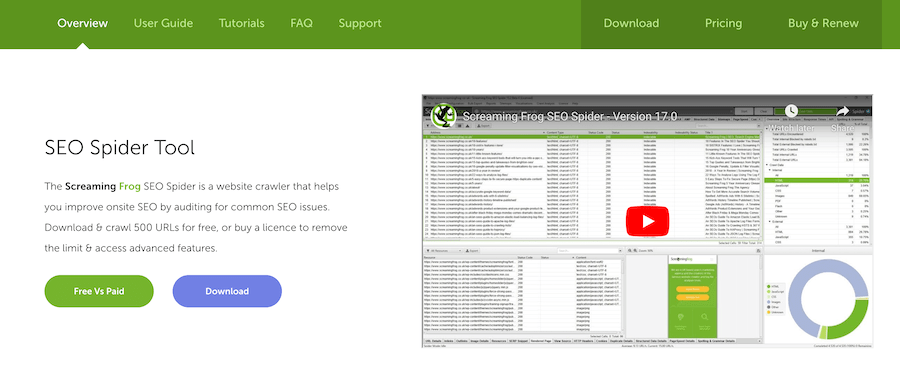
Key features:
- On-page SEO audit
- Website crawling
- Integration with Google Analytics and Google Search Console
- Comprehensive reports on your website, including competitors’ websites
Price:
- Free
- Pain plan available for $259/year
Google Search Console
Another essential tool you must have before launching your online store is Google Search Console (GSC). As a trusted tool constantly updated by Google’s developers, GSC draws results and analytics from Google’s own RankBrain, an artificial intelligence machine that sorts and ranks keywords and sentences on the internet.
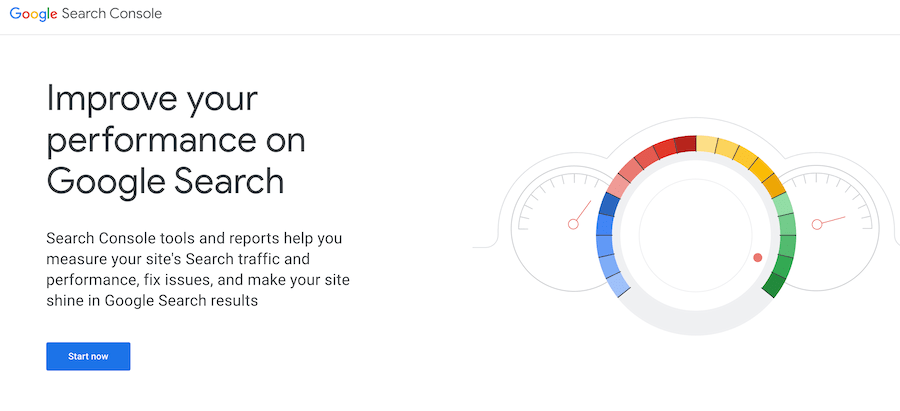
Key features:
- Website performance tracking
- Page indexing
- Keyword research
- URL inspection
- Sitemaps submission
- Mobile usability
- Security check
Price:
- Free
Ahrefs
To strengthen your SEO efforts, investing in a tool like Ahrefs is highly recommended. Ahrefs provides everything you need to optimize your online store and more. It allows you to analyze your competitors’ strengths and weaknesses, giving you a competitive edge.
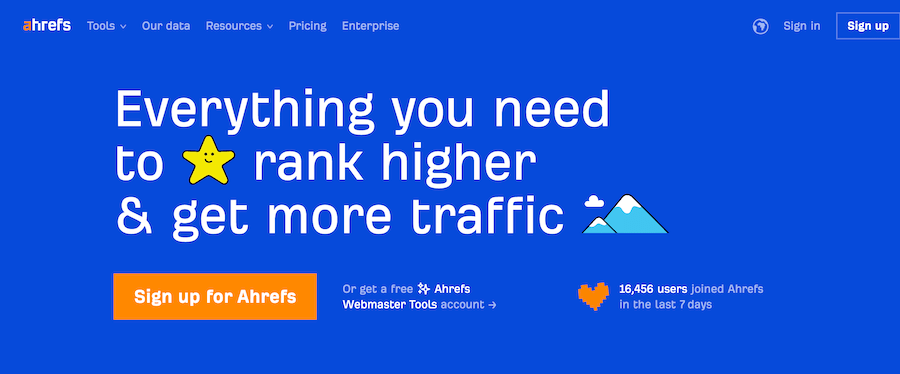
Key features:
- Competitor analysis
- Backlink analysis
- Keyword research
- Content explorer
- Site audit
Price:
- Lite plan for $99/month
- Standard plan for $199/month
- Advanced plan for $399/month
- Enterprise plan for $999/month
Google Keyword Planner
When it comes to finding valuable keywords, Google’s own Keyword Planner is the best tool to rely on. Many SEO experts consider it a must-have for every eCommerce marketing strategy.
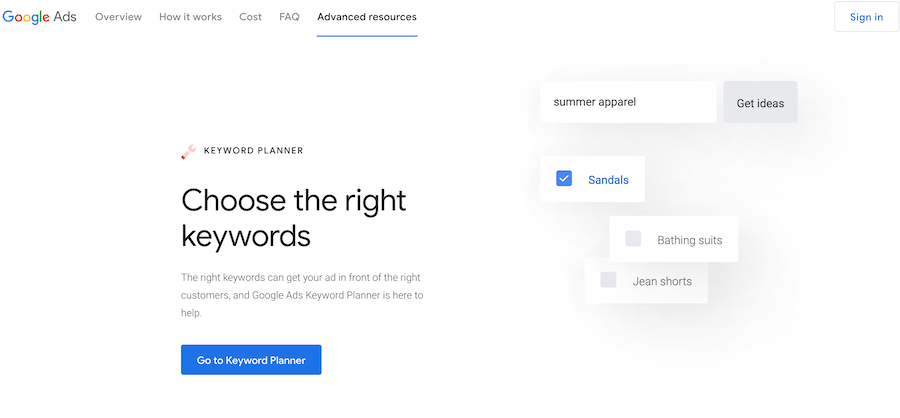
Key features:
- Keyword research
- Bid strategies
- Audience manager
- Ad preview
Price:
- Free
BuzzStream
Link building plays a crucial role in eCommerce marketing success. BuzzStream simplifies the process by making link-building easier and more organized. This tool enables you to build prospecting lists by scraping links from specific pages, including emails and contact information.

Key features:
- Email tracking
- Link building
- Building contact lists
Price:
- 14-day free trial
- Starter plan for $24/month
- Group plan for $124/month
- Professional plan for $299/month
- Custom plan starting at $999/month
Lighthouse
Lighthouse is a perfect SEO tool for your eCommerce business as it allows you to run a website audit with just a few clicks. Designed as an open-source tool, SEO specialists use Lighthouse for conducting free website audits. You can find Lighthouse under Chrome DevTools and run it on your online store.
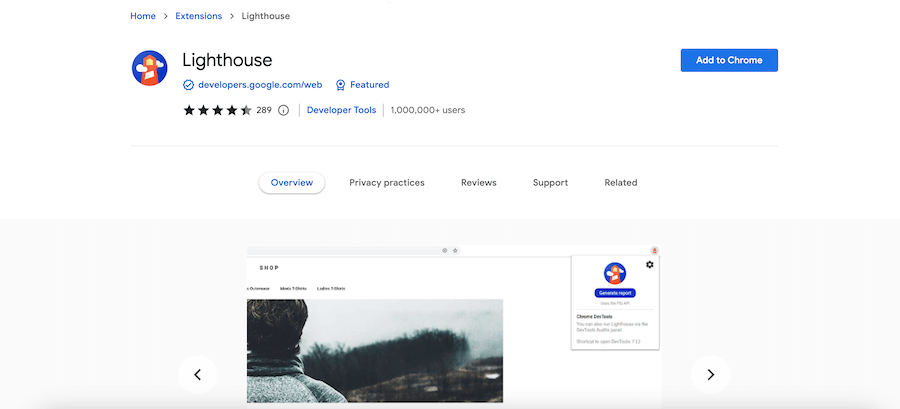
Key features:
- Comprehensive performance audit
- Accessibility audit
- SEO assessments
- Web improvement recommendations
Price:
- Free
GTmetrix
With almost 350 million pages analyzed and trusted by renowned brands like HP, PayPal, and Spotify, GTmetrix provides valuable insights into your website’s performance. Remote developer teams can monitor URLs from around the world, even on an hourly basis.
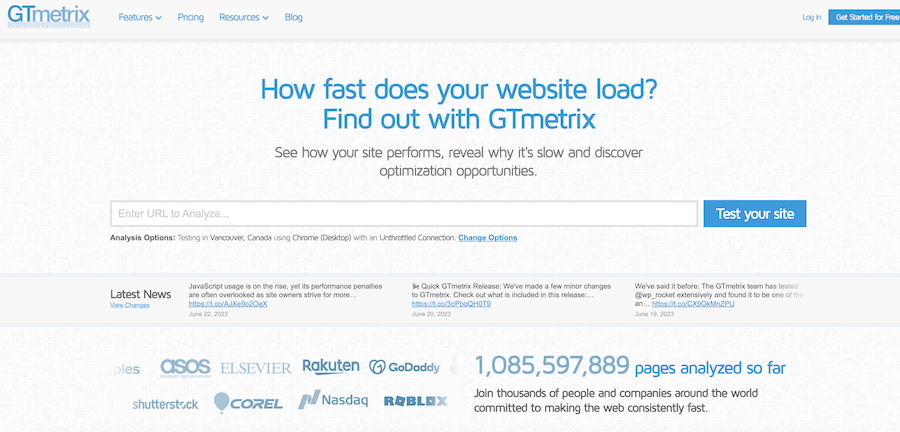
Key features:
- Page speed analysis
- Advanced page testings
- Customized reports
- Page performance monitoring
Price:
- Free plan
- Solo plan for $10/month
- Started plan for $21/month
- Growth plan for $42/month
Moz Pro
Moz Pro is a must-have tool for eCommerce marketers looking for smarter marketing solutions. It’s highly regarded among professionals in the industry, catering to both beginners and expert store owners.
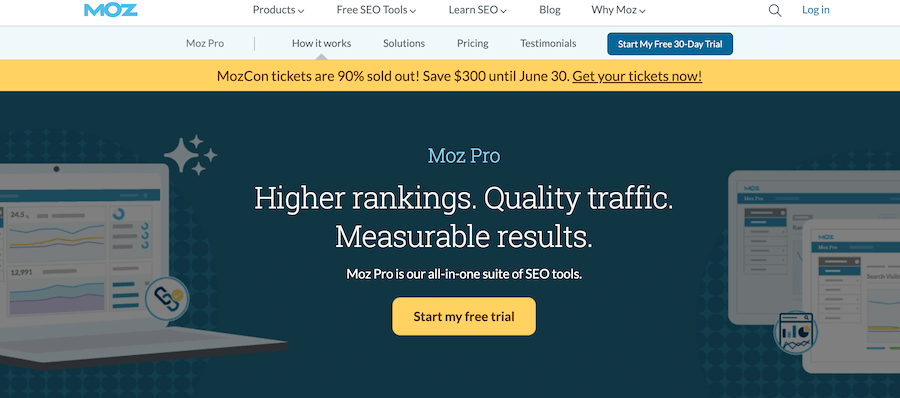
Key features:
- Explore keywords
- Conduct site audits
- Enhance link building
- Optimize for SEO
Price:
- 30-day free trial
- Standard plan for $99/month
- Medium plan for $179/month
- Large plan for $299/month
- Premium plan for $599/month
SpyFu
While your competitors pay to rank higher on Google, you have the opportunity to appear in top search results by implementing the right keywords. SpyFu is the tool that makes this possible.
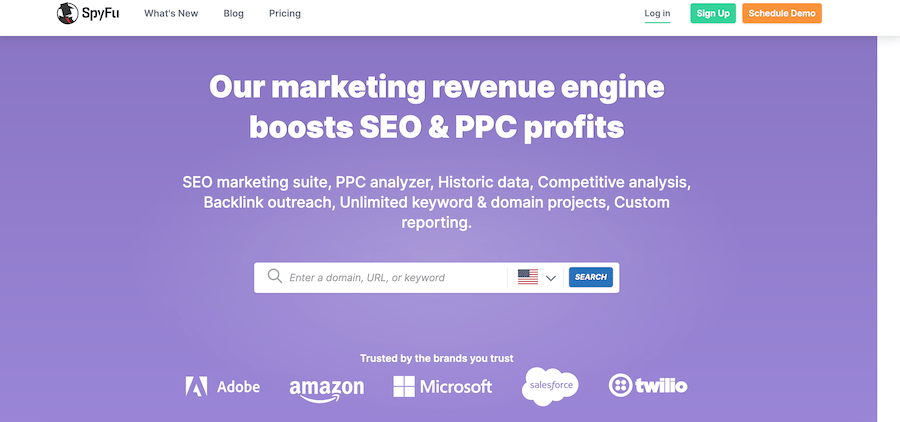
Key features:
- Competitor analysis
- Keyword research
- Keyword rank tracking
- PPC analyzer
- Backlink outreach
- Customized reports
Price:
- Basic plan for $39/month
- Professional plan for $79/month
- Team plan for $299/month
Ubersuggest
Ubersuggest is a free tool that, when integrated into your eCommerce marketing strategy, brings the real benefits of SEO. It provides rough estimates of visitors, keyword trends, cost-per-click value, and other insights.
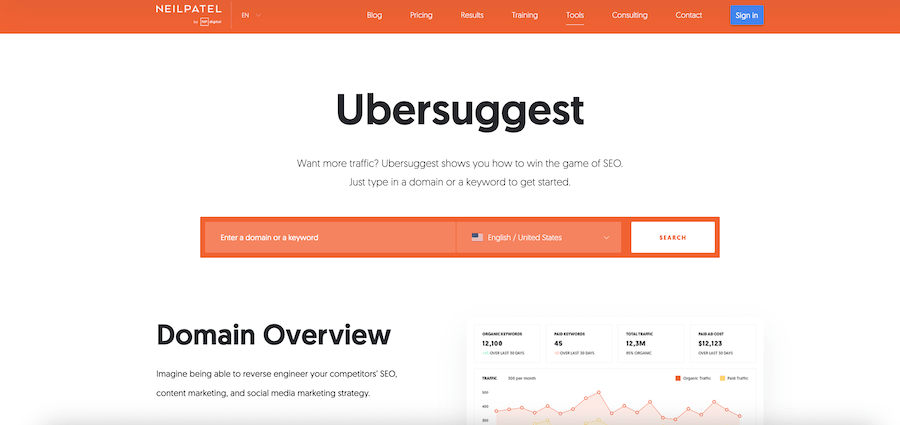
Key features:
- Keyword research
- Buyer intent
- Traffic estimation
- Backlinks
- Site audit
- Content suggestions
Price:
- Free plan
- Individual plan for $12/month
- Business plan for $20/month
- Enterprise plan for $40/month
SEO Quake
With its clean dashboard, precise results, and SERP analysis, SEO Quake has gained the trust of over 3 million users. It’s a browser-based SEO Toolbox that helps examine and track links, supported for Google Chrome, Mozilla Firefox, Opera, and Safari browsers, as well as for iPhones and iPad.
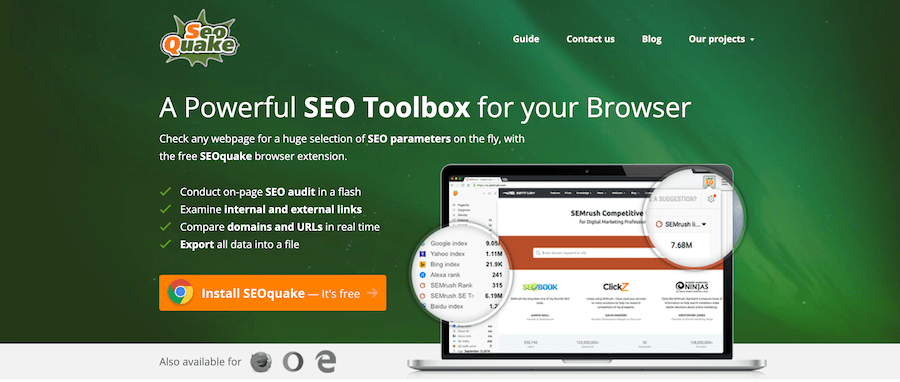
Key features:
- Link examination and tracking
- Detailed audits
- Website comparisons
- Data export
Price:
- Free
Google’s PageSpeed Insights
If you want to quickly and effectively analyze your online store’s content, PSI is a valuable tool to lean on. Using the tool is super easy – all you need is to type in the URL of your web page and wait for the analysis to complete.
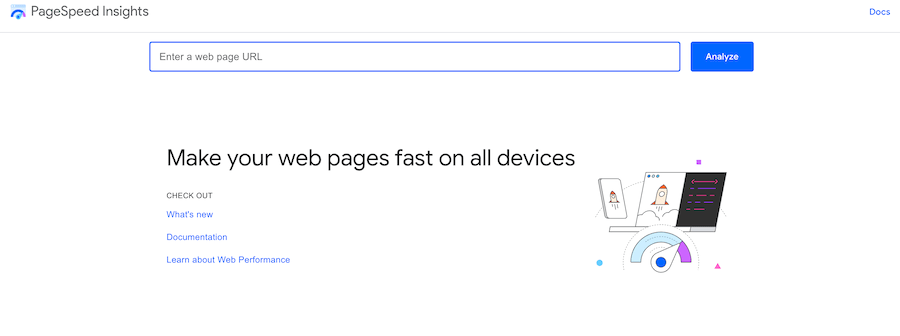
Key features:
- Field data analysis
- User experience by analyzing mobile and desktop versions
- Web performance insights
Price:
- Free
Linkody
To achieve strong search engine optimization (SEO), tracking and analyzing your link-building activities is vital. That’s where Linkody comes in – a powerful tool that provides comprehensive insights into your links.
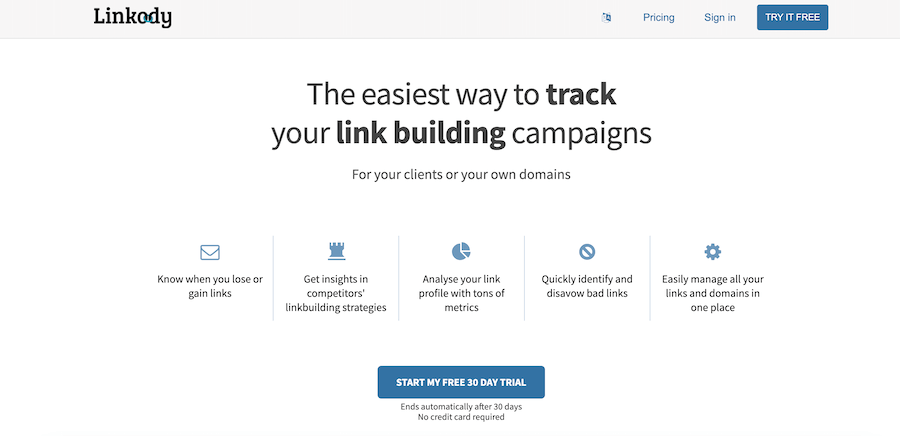
Key features:
- Backlink monitoring
- Link analysis
- Disavow tool
Price:
- 30-day free trial
- Webmaster plan for $13/month
- Advanced plan for $22/month
- Pro plan for $45/month
- Agency plan for $90/month
- Agency XL plan for $138/month
SEMrush
SEMrush is an all-in-one package SEO tool that allows you to perform website audits, track rankings daily, and analyze backlink opportunities.
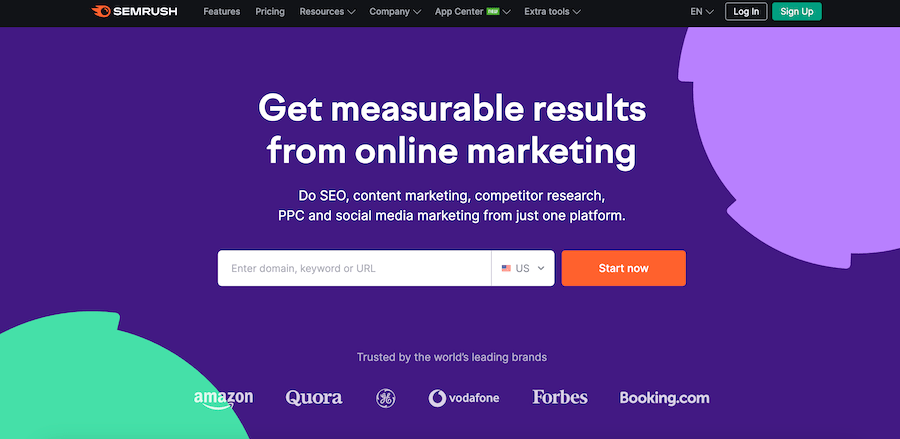
Key features:
- Perform website audit
- Keep an eye on ranking
- Conduct competitor analysis
- Explore backlink opportunities
- Take advantage of advertising and social media tools
Price:
- 7-day free trial
- Pro plan for $119/month
- Guru plan for $229/month
- Business plan for $449/month
Pitchbox
Say goodbye to hours spent crafting perfect pitches and follow-ups. and say hello to Pitchbox. With Pitchbox, you can streamline the tiresome process of outreach and connect with relevant contacts who can boost your eCommerce link-building efforts.
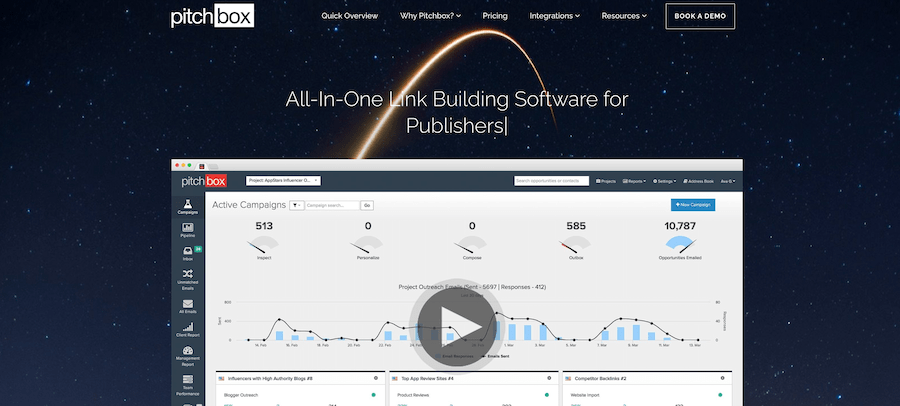
Key features:
- Outreach campaigns
- Backlink management
- Email management service
Price:
- Professional plan for $495/month
- Enterprise plan for $1350/month
Broken Link Checker
Identifying and fixing broken backlinks is just as crucial as link building. Broken Link Checker is a free tool that can scan an unlimited number of web pages to determine dead or broken links associated with your store. It’s compatible with various operating systems and ensures you focus only on the links that require attention.
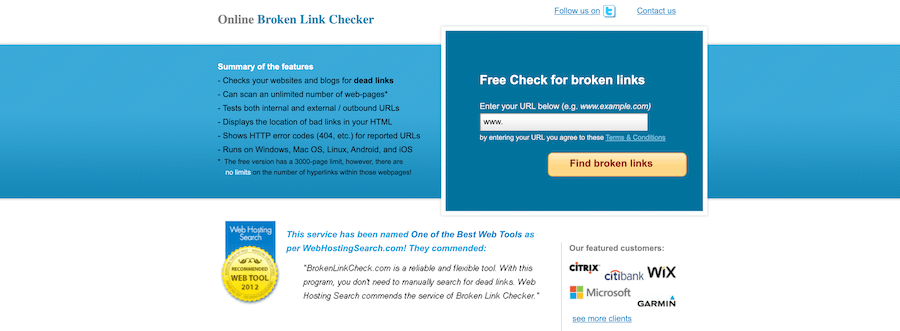
Key features:
- Identifies and reports broken backlinks
- Scans unlimited pages
Price:
- Free
All-In-One SEO
If you’re seeking one powerful tool to optimize your WordPress platform, look no further than All-In-One SEO. Ideal for beginners, this user-friendly plugin seamlessly integrates SEO into your website.
Moreover, it’s compatible with popular eCommerce platforms like WooCommerce. The best part? It’s completely free, making it an excellent choice for store owners.
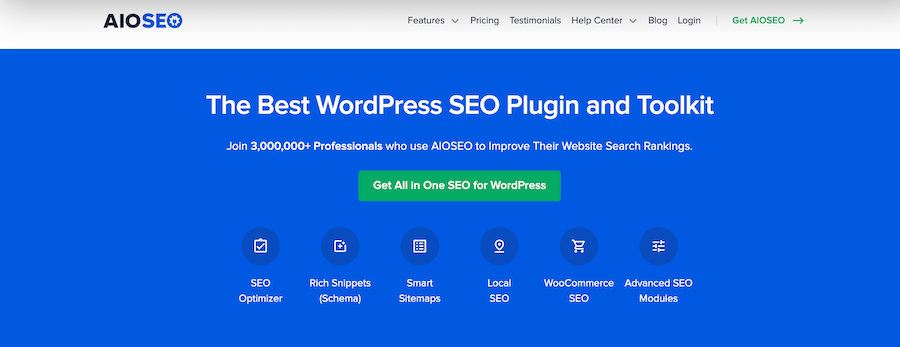
Key features:
- SEO audit
- XML sitemap generator
- Link assistant
- Keyword rank tracker
- Social media integration
- WooCommerce integration
Price:
- Free
- Basic plan for $49/month
- Plus plan for $99/month
- Pro plan for $199/month
- Elite plan for $299/month
Website Grader
Powered by HubSpot, Website Grader breaks down your website’s analysis into four divisions: performance, mobile, SEO, and security. With its sleek design, user-friendly interface, and intuitive navigation, Website Grader easily stands out among other site analysis tools.

Key features:
- Web performance
- Mobile optimization
- SEO improvements
- Security analysis
Price:
- Free
Social Media eCommerce Marketing Tools
Social media serves as a key digital channel in enhancing brand visibility, attracting new customers, and ultimately, driving sales. In today’s digital landscape, having a strong presence on social media platforms is essential for any online business as they hold significant potential for promoting and growing your venture.
To support your eCommerce marketing endeavors, we have curated a collection of top-notch social media tools to help you to organize, schedule, and monitor your posts.
Buffer
Buffer is a pioneer in social media marketing platforms, offering easy-to-use account management for major social media channels.
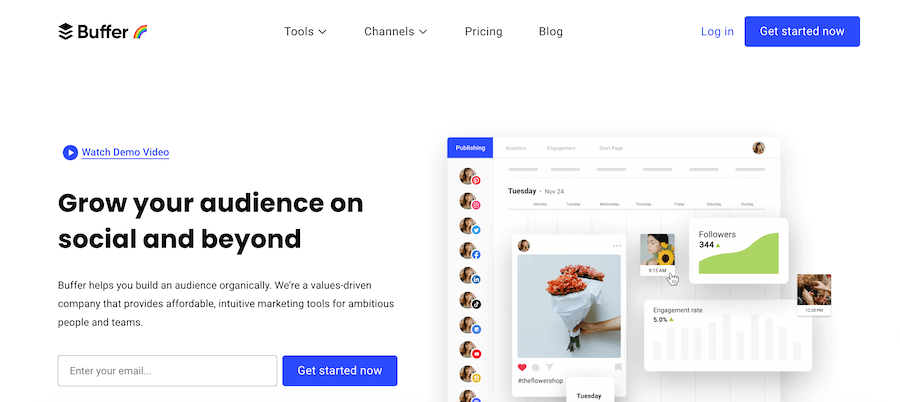
Key features:
- Analyze social media performance
- Schedule posts
- Engage with the audience
- Generate unique ideas with the AI assistant
Price:
- Free
- Essential plan for $6/month
- Team plan for $12/month
- Agency plan for $120/month
Twitter Analytics
Specifically designed to help resellers get more insights via Twitter, Twitter Analytics helps eCommerce professionals with their Twitter marketing strategy.
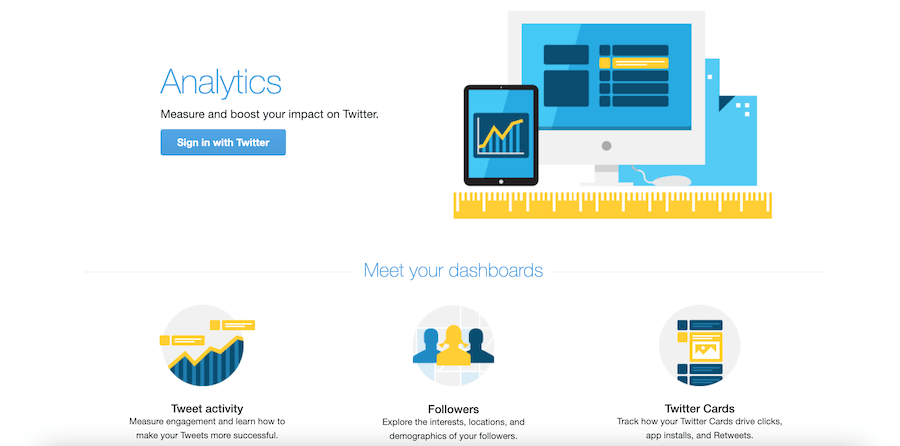
Key features:
- Shows followers’ activity
- Analyzes your tweets and those of your followers
- Recommends best times to tweet
Price:
- Free for up to 1,000 followers
Sprout Social
As the name itself suggests, Sprout Social allows your business to ‘sprout’ via social media. If you’re looking for a smarter way to reach wider audiences on social media, this tool is for you. It allows you to enhance your product/service ratings and drive conversions.
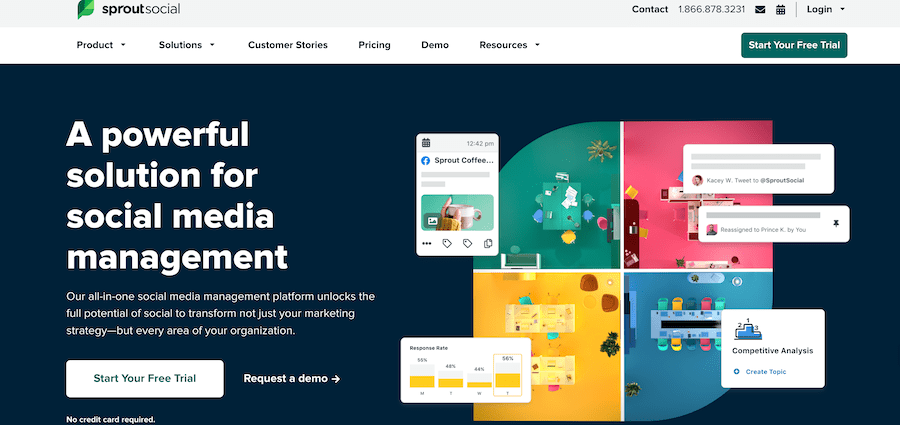
Key features:
- Social media management
- Planning and publishing posts
- Track your campaigns
- Measure your social media performance
Price:
- 30-day free trial
- Standard plan for $249/month
- Professional plan for $399/month
- Advanced plan for $499/month
- Enterprise plan – custom-build plan and pricing
Social Champ
Social Champ is an all-in-one social media marketing tool that cuts down the clutter in your social media marketing processes while staying within budget. The tool is power-packed with versatile features, allowing you to easily schedule posts on multiple social media platforms.
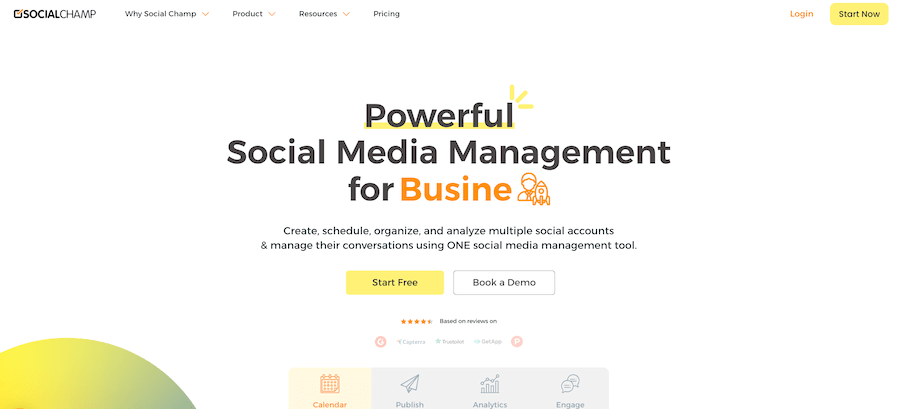
Key features:
- Post on Facebook, Twitter, and LinkedIn
- Automatic publishing
- Customized post scheduler
- Assistance from Lead Growth Services
- 24/7 customer support
Price:
- Professional plan for $47/month
- Enterprise plan – price upon request
Later
Ideal for Instagram, Facebook, Pinterest, and Twitter, Later is a comprehensive social media platform that helps you plan, schedule, and analyze your posts.

Key features:
- Assists in creating content
- Provides an AI-powered social media caption writer
- Keeps posts organized and scheduled according to your preferences
- Supports various media types: photos, carousels, and videos
- Works with Instagram, Facebook, TikTok, Pinterest, Twitter, and LinkedIn
Price:
- 14-day free trial
- Starter plan for $18/month
- Growth plan for $40/month
- Advanced plan for $80/month
TweetDeck
As a Twitter-focused tool, TweetDeck allows you to manage multiple accounts, track topics, and organize your activities effectively. It’s available as a web app or Chrome extension and is free to use with a Twitter account.

Key features:
- Schedule tweets
- Track post performance
- Manage multiple accounts
- Large layout that displays more than one tweet column
Price:
- Free
SocialOomph
Compatible with all social media platforms, SocialOomph is an advanced social media and blog post tool that offers a variety of features, starting from creating and scheduling posts and articles, to bulk uploading, and keyword filtering.
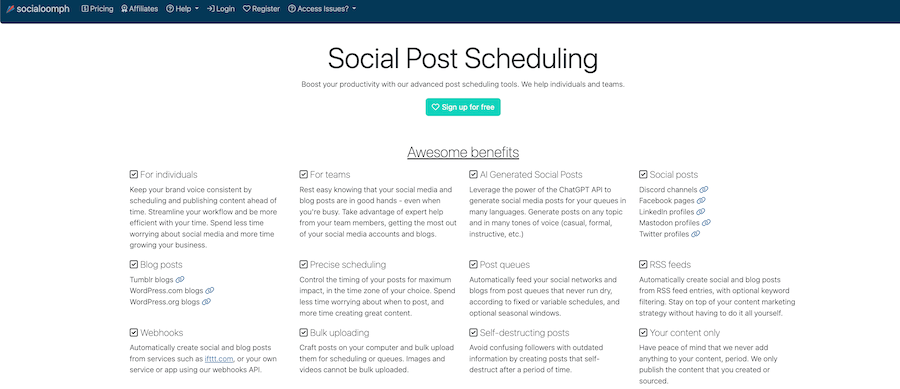
Key features:
- Schedule in bulk up to 500 posts
- Analyze social media activity
- Recycle social media posts
- Supports all social media apps including Reddit, Tumblr, Shopify, and WordPress
- Browser extensions available across Google Chrome, Mozilla Firefox, Safari, and Edge
Price:
- Free
- Professional plan for $12/month (7-day free trial)
- Business plan for $21/month (14-day free trial)
Taggbox UGC Suite
Want to convert your user-generated content into shoppable content and build brand success? Taggbox’s UGC Suite solution helps you gather social media content published on Instagram, Facebook, Twitter, or Pinterest using hashtags, tags, or mentions of your brand.
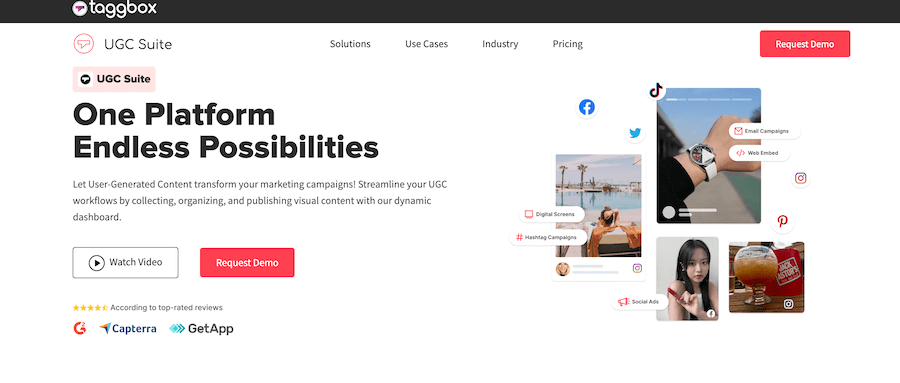
Key features:
- Collect UGC content from +20 platforms
- Acquire rights from UGC original creators to use their content in your marketing campaigns
- Customize your UGC posts in accordance to your brand’s message
Price:
- Prices upon request
Friends+Me
Friends+Me is a social tool available across multiple social media platforms, allowing you to manage your posts and create a thriving presence online.
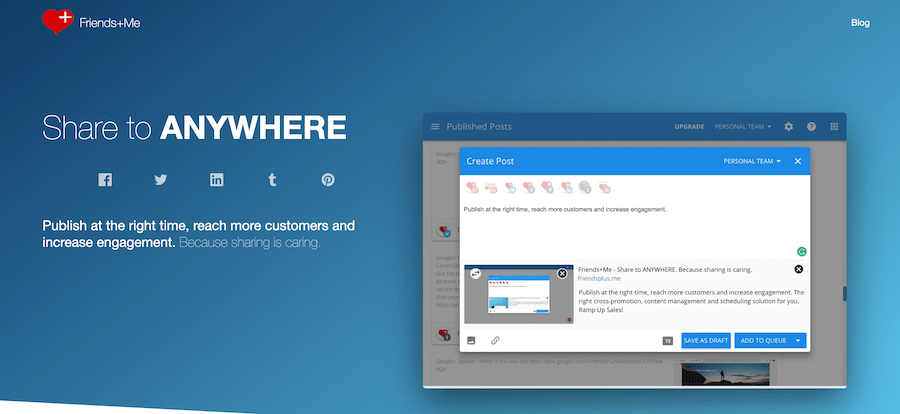
Key features:
- Supports Facebook, Twitter, LinkedIn, Tumblr, and Pinterest
- Schedule posts in bulk
- Create a workspace with your co-workers
- Available on both mobile and desktop
Price:
- Free trial
- Individual plan for $7/month
- Small plan for $24/month
- Medium plan for $49/month
- Large plan for $215/month
BrandsMentions
Social media monitoring has become a huge part of the latest eCommerce marketing trends. BrandsMentions is a pioneer in this industry, with powerful crawlers that discover and analyze social media conversations and identify brand mentions.

Key features:
- Comprehensive web crawling
- Monitor mentions in 120 languages
- Import data from Instagram, Facebook, LinkedIn, YouTureb, Twitter, Reddit, and more
- Identify marketing influencers
Price:
- 7-day free trial after which you are charged $99/month
Crowdfire
With features like monitoring meetings and measuring social media performance, Crowdfire is a valuable tool for many global companies. Connecting with Shopify, Etsy, WordPress, and YouTube accounts, it allows scheduling product updates and more. Crowdfire offers a free trial and quote-based plans with advanced options for up to 25 linked accounts in the VIP plan.
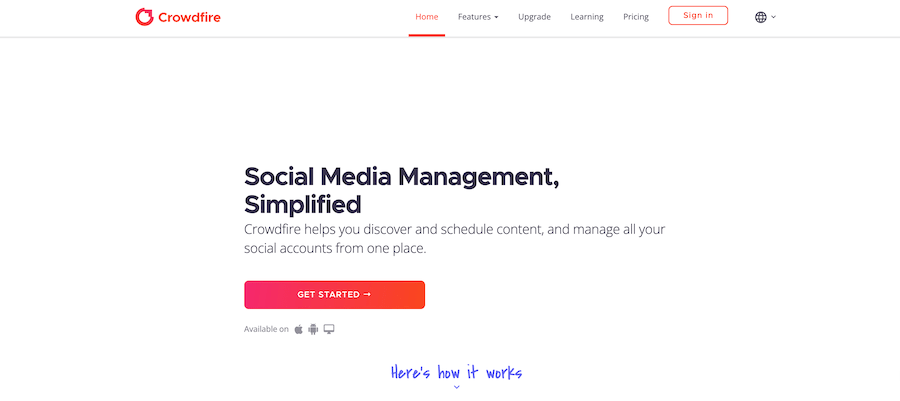
Key features:
- Curate articles and images
- Customize your RSS Feed
- Monitor mentions and comments
- Schedule product updates, blog posts, video announcements
- Integration with Shopify, Etsy, YouTube, Medium, and WordPress
Price:
- Free
- Plus plan for $7/month
- Premium plan for $37/month
- VIP plan for $75/month
Hootsuite
Hootsuite is a well-known tool among online store owners, offering all the basic features such as planning, creating, and scheduling posts.
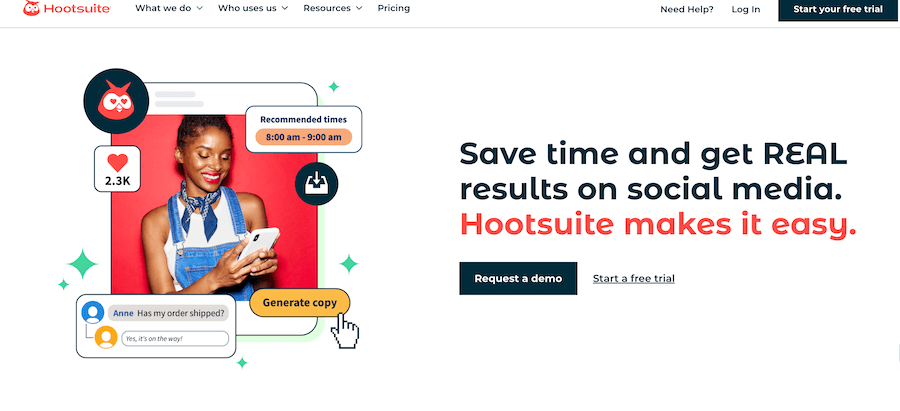
Key features:
- Create social media planner and publish based on your customized schedule
- Keep an eye on brand mentions
- Invite team members and share tasks
- Integrate with all major social media platforms
Price:
- 30-day free trial
- Professional plan for $99/month
- Team plan for $249/month
- Business plan for $739/month
- Enterprise plan – customized
CoSchedule
If you are looking for a tool that encompasses every segment of eCommerce marketing, CoSchedule is something to look into. It comes with two main sub-products – marketing calendar and marketing suite.
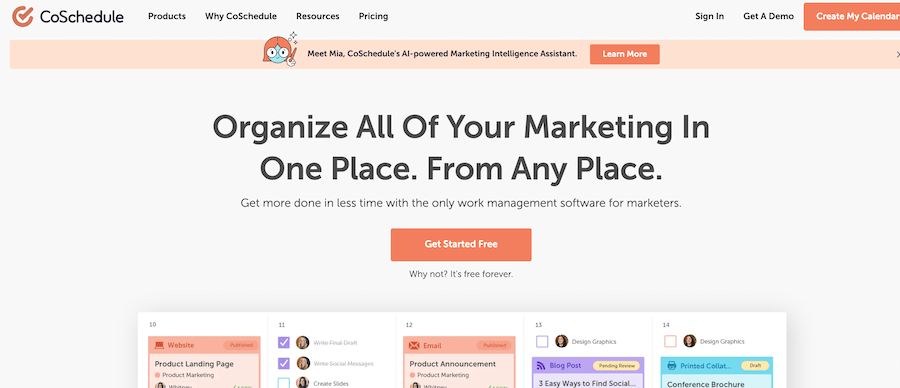
Key features:
- Create a social media calendar
- Automatically schedule your posts
- Coordinate different projects
- Integrates with WordPress
Price:
- Free
- Pro Marketing Calendar for $29/month
- Marketing Suite – price on request
Fanpage Karma
Fanpage Karma helps track audience engagement and improve online sales by analyzing posts and providing insightful reports.

Key features:
- Compatible with multiple social media channels
- Generate periodical reports
- Receive strategy proposals
- Monitor engagement
Price:
- 14-day free trial
- Free plan
- Bronze plan for $69/month
- Silver plan for $199/month
- Gold plan for $299/month
- Platinum plan for $799/month
SharedCount
SharedCount is an eCommerce marketing tool focusing on social media monitoring, providing users with data on how followers interact with their content.
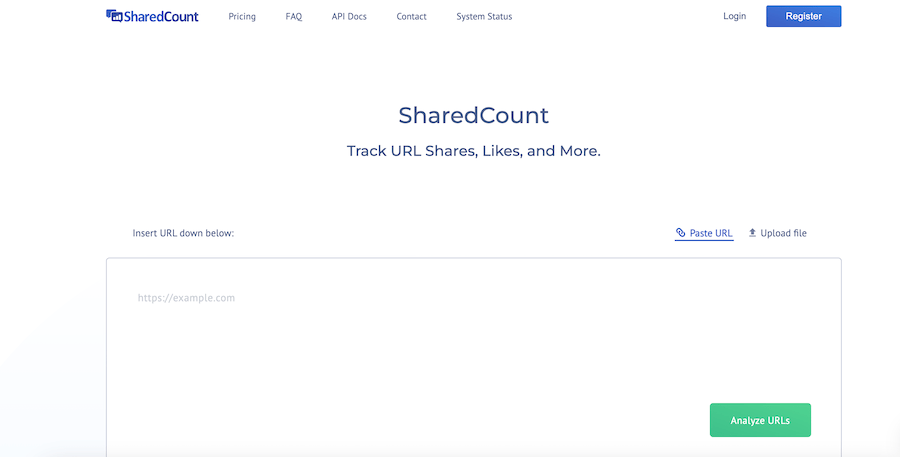
Key features:
- URL shares and likes tracking
- Integrate data with API keys
- Supported platforms include Facebook, Pinterest, Twitter, Reddit, LinkedIn, Google+, and Google Buzz
Price:
- Personal plan for $40/month
- Professional plan for $160/month
- Enterprise plan for $640/month
Share Link Generator
Created by web designer Patrick St. John, Share Link Generator instantly generates links for social media platforms and email shares.

Key features:
- Available for Facebook, Twitter, LinkedIn, and Pinterest
Price:
- Free
Venngage
Venngage is the perfect tool if you’re looking to create attractive and highly engaging visual content, and it’s especially amazing for generating infographics, posters, mind maps, reports, and guides.
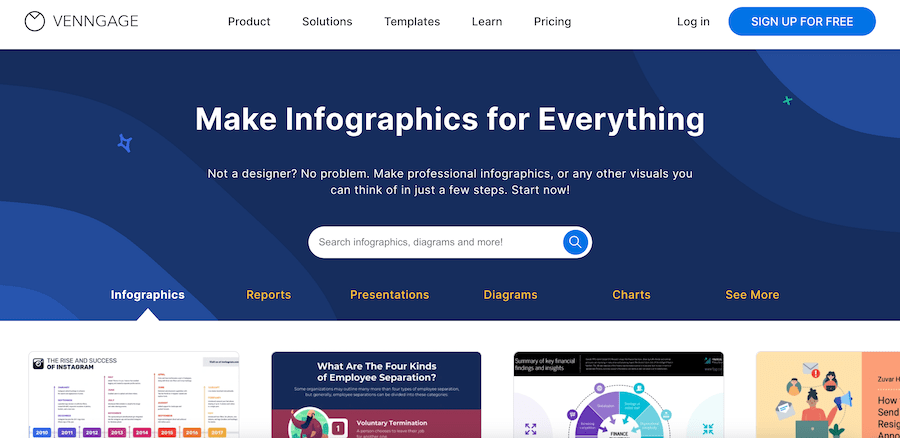
Key features:
- +7,500 templates available to use
- +3,000 stock photos
- +40,000 icons and illustrations
- Convenient drag-and-drop editor
Price:
- Free
- Premium plan for $19/month
- Business plan for $49/month
Listen
Previously known as Union Metrics, Listen is a social marketing intelligence tool part of Brandwatch that provides valuable insights on posts, potential reach, and impressions.
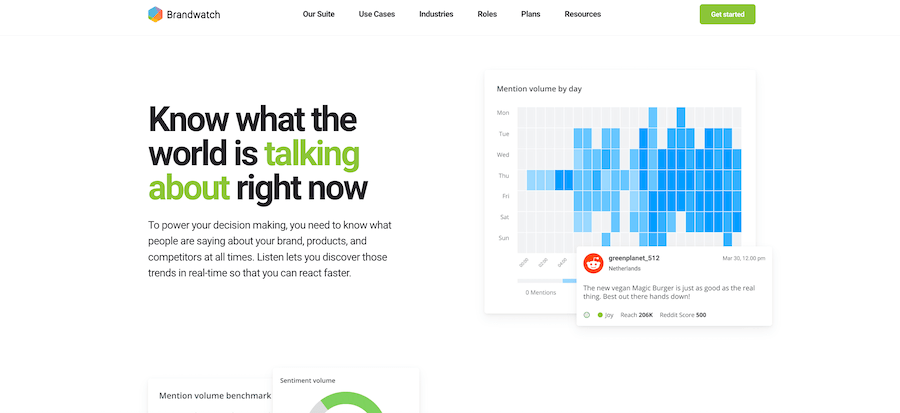
Key features:
- Manage social media channels from one place
- Monitor likes, shares, and click-through rates
- Suports Twitter, Instagram, YouTube, and Facebook
Price:
- Price upon request
Followerwonk
Followerwonk is a popular Twitter analytics tool that provides detailed information on followers and facilitates easy discovery of new markets and potential audiences.
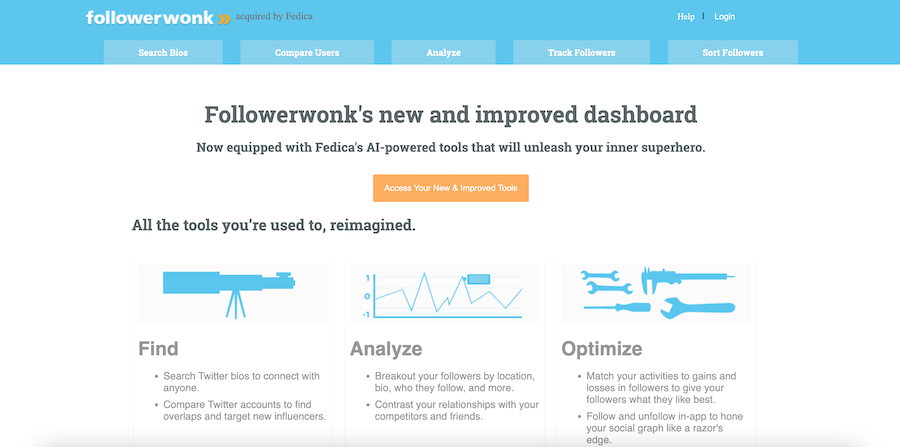
Key features:
- Contact influencers
- Discover potential followers
- Conduct competitor analysis
- Publish on Facebook, Twitter, Instagram, LinkedIn, Mastodon, and Pinterest
Price:
- $29/month
MeetEdgar
MeetEdgar is a valuable social media management that automates your work on multiple social media accounts, saving you plenty of time and effort you can invest in more consuming tasks.
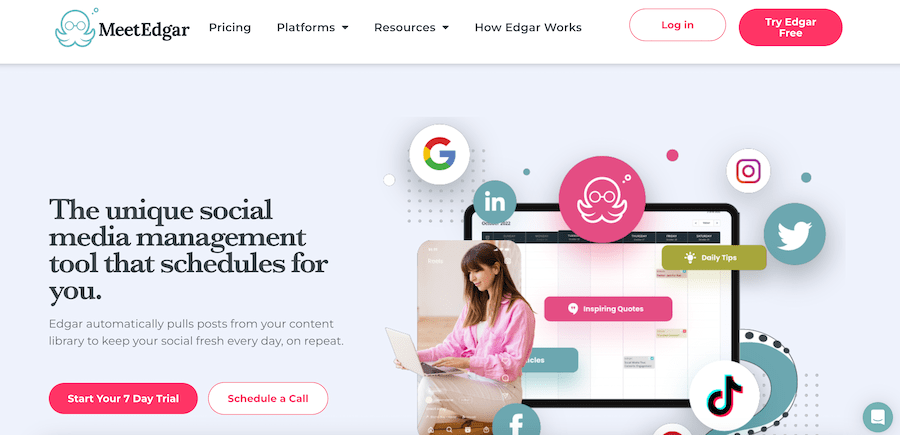
Key features:
- Schedule unlimited posts
- Drive new leads
- Track in real-time performance metrics
- Share workspace with 20 team members
Price:
- Eddie Monthly Plan for $29.99/month
- Edgar Monthy Plan for $49.99/month
Content Marketing eCommerce Tools
In the world of eCommerce, content marketing plays a vital role in attracting and converting visitors into loyal customers. However, content marketing is no longer as simple as writing a short, poorly-researched article.
To make a real impact and provide value to your readers, extensive research and high-quality content are essential. Additionally, investing in the right tools can even further maximize the effectiveness of your content strategy. Here are some widely-used tools to create exceptional content for your eCommerce blog.
Scoopit
With over 8 million content curators, Scoopit is an essential content creation tool for your business. It features an effective search filter for curating new content and keeping track of the latest eCommerce trends.

Key features:
- Curate content for blog posts, newsletters, social media, content hubs, content API, and personal branding
- Distribute content across different channels
- Use custom templates
- Receive email alerts
- Benefit from online support
- Integration with Google Analytics 4
Price:
- Free
- Pro plan for $14.99/month (7-day free trial)
- Plus plan for $67/month (7-day free trial)
- Enterprise plan – price upon request
KeywordEye
KeywordEye is a tool that helps you discover new keyword suggestions, identify the most common questions people ask on search engines, and uncover competitors’ keywords.
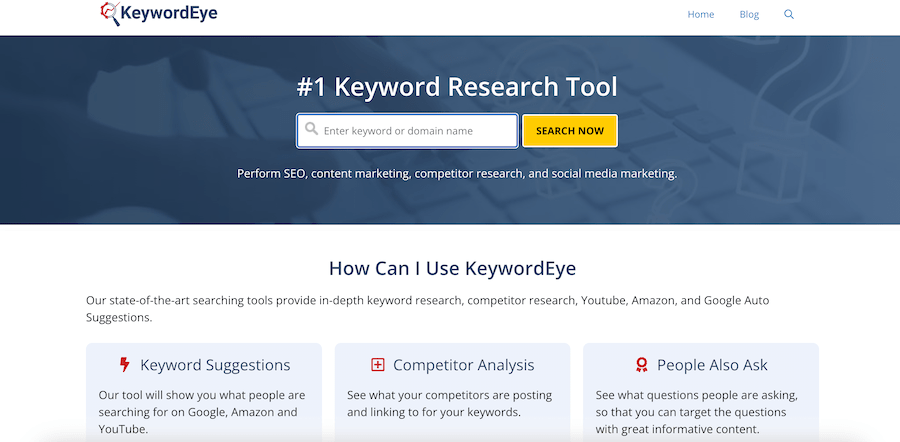
Key features:
- Keyword research
- Competitor analysis
- Backlink analysis
- Social media keywords
Price:
- Free
- Premium plan
Feedly
Staying updated with the latest trends and burning topics is crucial for content creators. Feedly is a tool that allows you to keep track of the topics and information that matter to you. Instead of spending time researching the internet for the latest industry news, Feedly finds the right sources for you. This allows you to focus on creating high-quality, well-written content.
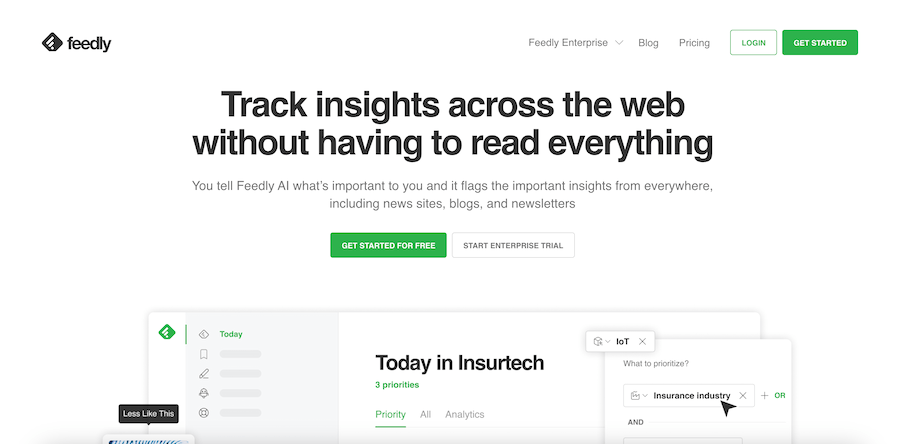
Key features:
- Create 1,000 feeds and more (based on your plan)
- Available to share on Zapier, Buffer, LinkedIn, and IFTTT
- Save on OneNote, Evernote, and Pocket
- Use premium fonts
- Receive support
Price:
- Pro plan for $6/month
- Pro+ plan for $8/month
- Enterprise plan – price upon request
Google Docs
Google Docs is an ideal tool for writing, editing, and sharing content within your organization. It’s free, simple to use, and accessible from anywhere.
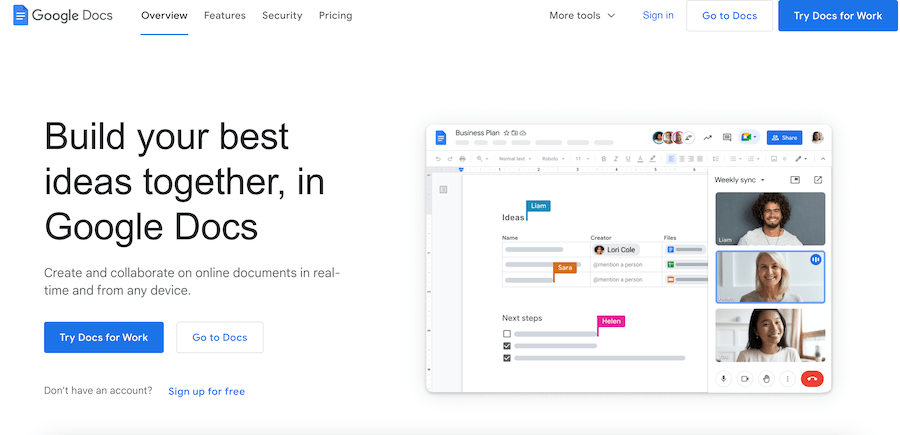
Key features:
- Easy file sharing
- In real-time editing with team members
- Helpful Smart Compose feature
- Seamless integration with the rest of Google apps
Price:
- Free
AnswerThePublic
AnswerThePublic is a tool that provides a better perspective on the most relevant content ideas and keywords. It automates the process of searching for phrases by inserting specific keywords.

Key features:
- Find most search queries based on your keyword
- Receive search suggestions
- Compare search behaviors over a certain time
- Export data in CSV files
Price:
- Free
- Individual plan for $9/month
- Pro plan for $99/month
- Expert plan for $199/month
Grammarly
Grammarly is a must-have tool for delivering premium quality content to your readers. Using artificial intelligence and natural language processing, Grammarly helps improve your writing skills.
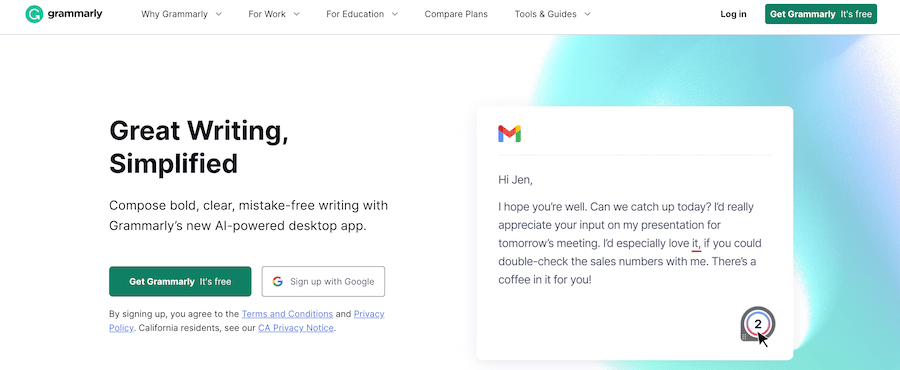
Key features:
- Available to use in Word and Google Docs
- Identifies grammar mistakes
- Detects plagiarism
Price:
- Free
- Premium plan for $30/month
- Business plan from $75/month (7-day free trial)
Keyword Tool
Keyword Tool is a valuable alternative to Google’s Keyword Planner. It helps you find relevant keywords by understanding Google’s Autocomplete algorithm. You can discover long-tail keywords and use them to create optimized content.
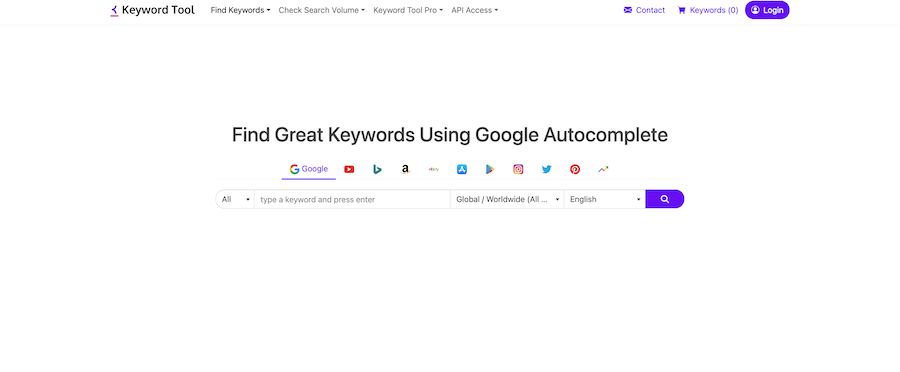
Key features:
- Find relevant keywords
- Analyze keyword search volume
- Examine keywords’ competitiveness
- Inspect the average CPC (Cost-per-click) rate
Price:
- Free
- Pro Basic plan for $69/month
- Pro Plus plan for $79/month
- Pro Business plan for $159/month
Canva
Canva is a design tool that makes it easy to create visual content for your online store. You don’t need extraordinary design skills as Canva offers ready-to-use templates in various formats.

Key features:
- Drag-and-drop editor
- AI-powered design tools
- over 250,000 templates
- over 1 million images
- 5GB storage
Price:
- Free
- Canva Pro for $19.99/month (30-day free trial)
- Canva for Teams for $14.99/month (30-day free trial)
Wepik
Wepik is another content marketing tool that allows you to create visually appealing infographics for your blog articles.
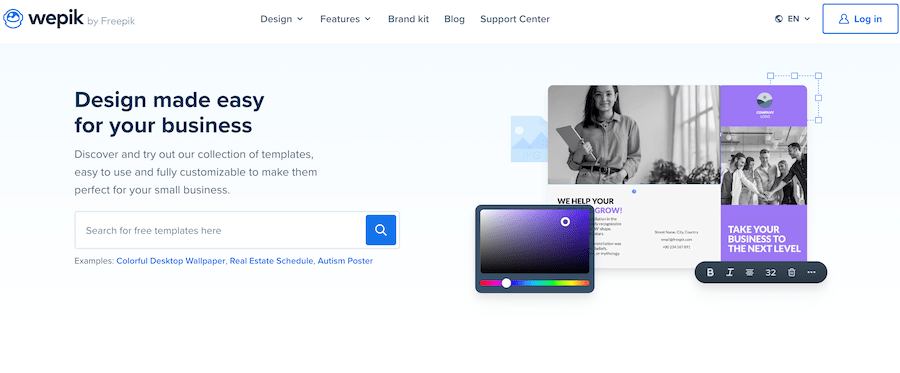
Key features:
- Ready-to-use social media and email marketing formats
- Convenient drag-and-drop feature
- AI image and presentation generator
- Background removal
- Social media post scheduler
Price:
- Free
Copyscape
Copyscape helps you create content that won’t be penalized by search engines. It detects plagiarism and duplicate content by comparing your content against online results.
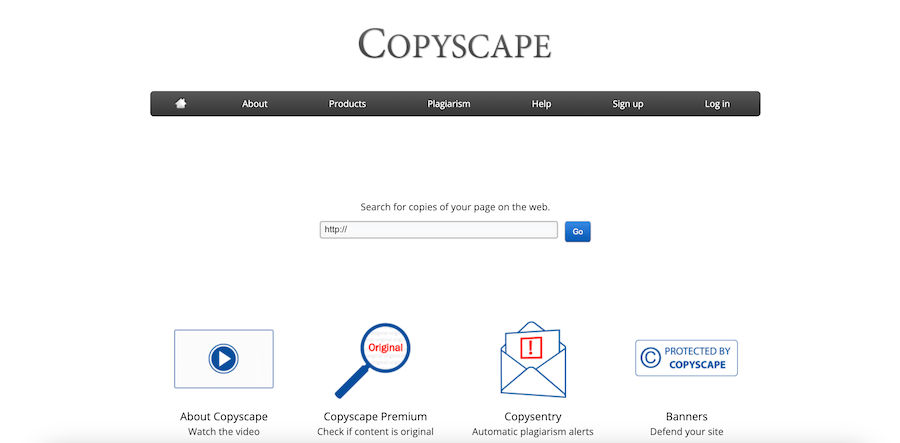
Key features:
- Detects plagiarism
- Discovers duplicate content
Price:
- 3c per search (up to 200 words)
VistaCreate
Similar to Canva, VistaCreate allows users to create both static and animated designs for articles or social media posts.
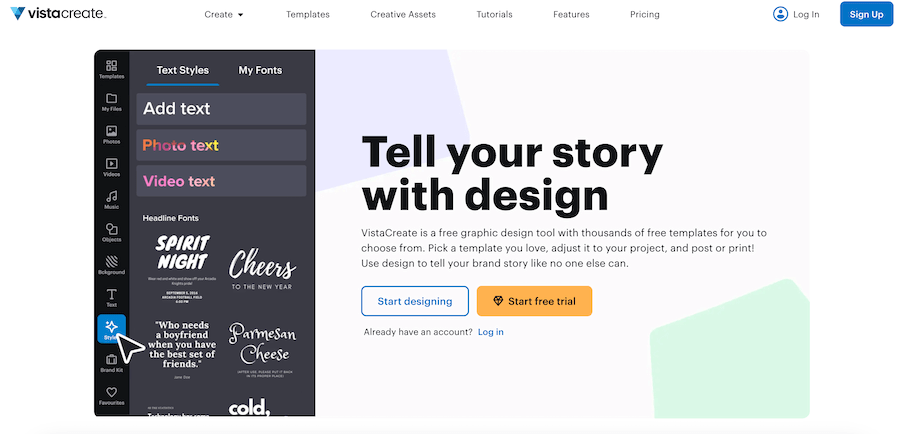
Key features:
- Thousands ready-to-use templates
- +1 million photos and videos
- Free animations, music, and fonts
- Post scheduling on Facebook, Instagram, and Pinterest
- 10GB storage
Price:
- Free
- Pro plan for $10/month (14-day free trial)
TinyPNG
Visuals are essential for articles, but they must be properly optimized. TinyPNG is a tool designed to compress while maintaining image quality and transparency. TinyPNG is useful for an eCommerce business, as it can be used for all the pictures uploaded to your store, thus, helping your web load faster and improving the overall user experience.
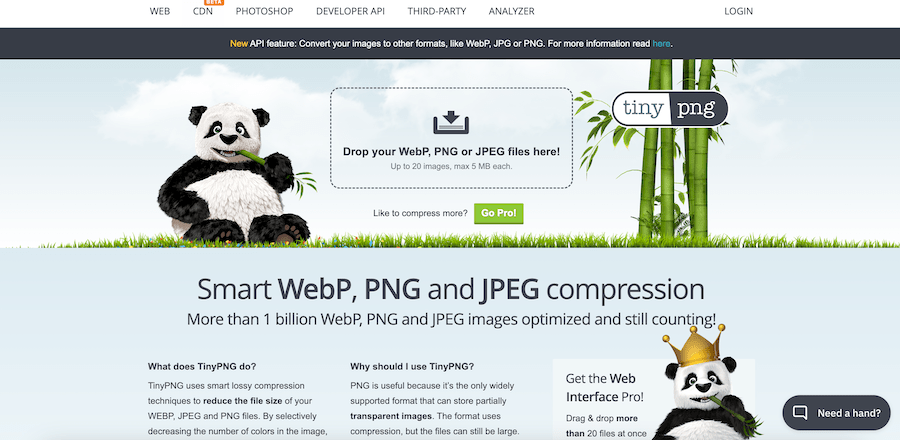
Key features:
- Compress images
- Upload files with a drag-and-drop tool
- Works with WEBP, JPEG, and PNG files
Price:
- Free
- Web Pro plan for $39/month
Monster Insights
Monster Insights allows you to discover the content that your visitors are interested in. It saves time by letting you know how effective your content is. You can measure and analyze visits and optimize your content accordingly.
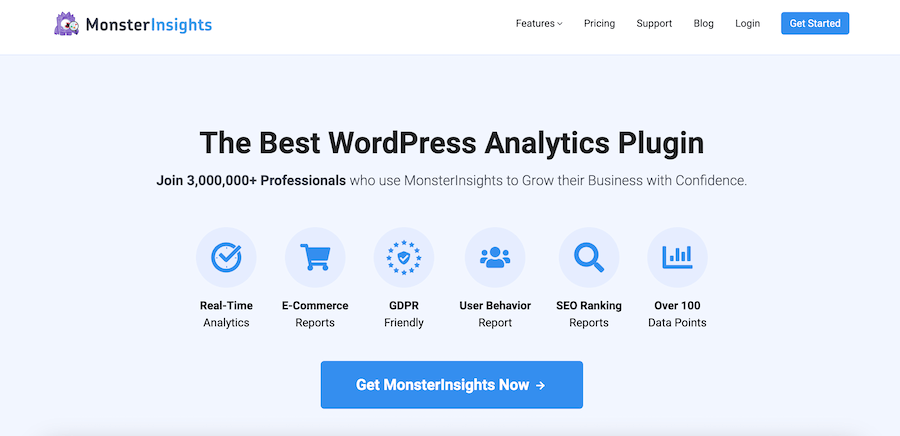
Key features:
- SEO score tracking
- Post tracking
- Focus keyword tracking
- Custom events tracking
- Integration with Google Analytics 4
Price:
- Plus plan for $99/month
- Pro plan for $199/month
- Agency plan for $399/month
Siteliner
Similar to Copyscape, Siteliner is a tool that identifies duplicate content. What’s more, it also helps maintain your site’s search engine rankings by identifying errors related to linking domains and page health.
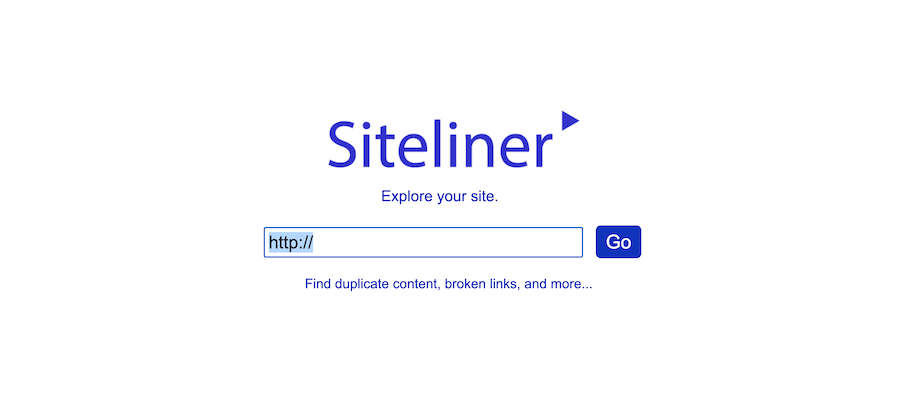
Key features:
- Identifies duplicate content
- Discovers broken links
- Locates skipped pages
Price:
- Free
- Premium plan – 1c per page
Animoto
Animoto is a video editing app that allows you to create effective video content to promote your online store. It enables you to build high-quality (1080p) videos by editing slides, changing fonts, customizing tones, and including licensed music tracks.

Key features:
- Build high-quality videos
- Benefit from watermark logo
- Use the drag-and-drop photo maker
- Take advantage of the built-in photo library
Price:
- Free
- Basic plan for $8/month
- Professional plan for $15/month
- Professional Plus plan for $39/month
Parse.ly
Parse.ly helps increase customer engagement by providing entrepreneurs with instant content insights and in real-time tracking results.
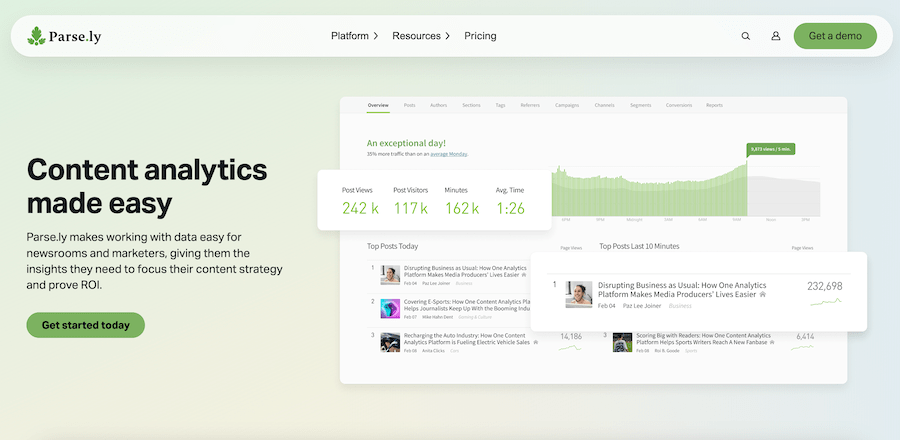
Key features:
- Access to content analytics
- Performance tracking on blogs, landing pages, and social media channels
Price:
- Price upon request
Visme
Breaking up your blog content with visuals and creating interactive blog experiences can be a great way to increase readership and further engage your audience. Visme is a visual content creation tool that allows you to create different visuals for your blog posts.
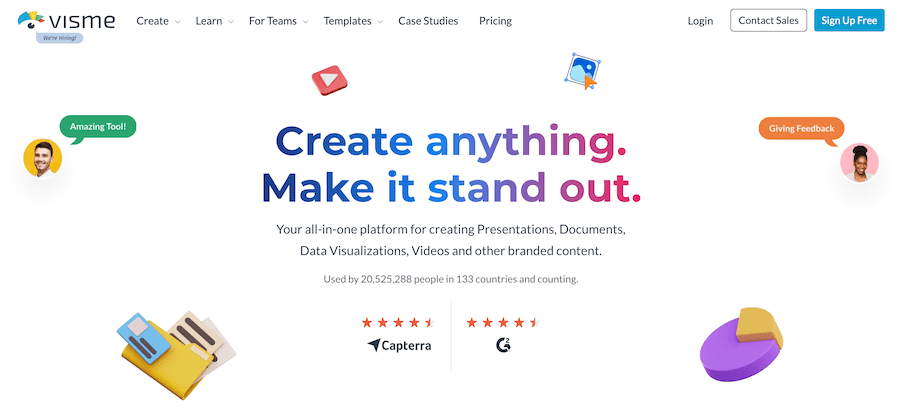
Key features:
- +1,000 templates to choose from
- Generate customized content calendar
- Access to high-quality resolution photo gallery
- Create presentations, graphics, videos, and mockups
- Download and embed different formats in your blog posts
Price:
- Free
- Starter plan for $12/month
- Pro plan for $24/month
- Visme for Teams – price upon request
eCommerce Marketing: Email Marketing Tools
Email marketing serves as a powerful tool for promoting business services and products. With its proven ability to convert subscribers into customers and impressive return on investment, email marketing is highly favored by eCommerce professionals.
By effectively implementing email marketing strategies, you can successfully guide potential customers through the final stages of the sales funnel and nudge them toward completing their purchases. Sending out newsletters and reducing card abandonment rates are only some of the many things you can do with this strategy.
To ensure the effectiveness of your email marketing efforts, however, it’s crucial to develop a robust eCommerce marketing strategy and utilize the appropriate tools. Now, let’s explore the commonly used tools for email marketing in eCommerce.
MailChimp
MailChimp is a well-known email marketing platform that offers a range of features to streamline your campaigns. With the ability to send thousands of emails within minutes, MailChimp makes it easy to reach new customers and engage with your existing ones.
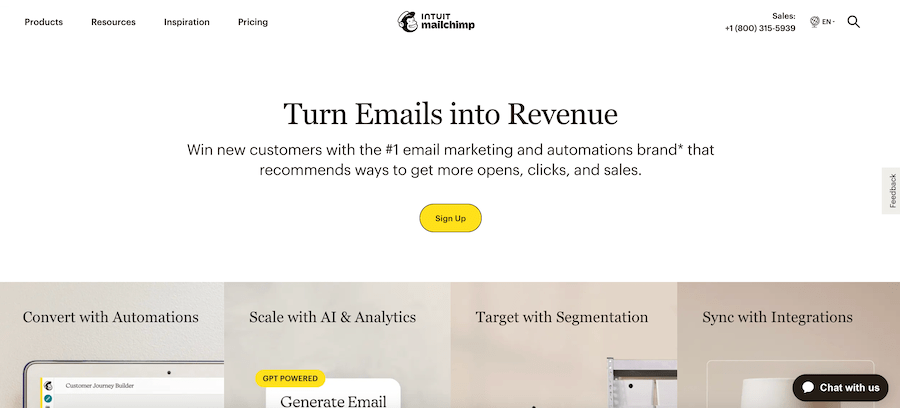
Key features:
- Email automation available for welcome emails, card abandonment reminders, and customer re-engagement messages
- Premade templates for easy customization
- Advanced testing tools for optimal campaign performance
- Time zone optimization and demographic prediction
Price:
- Free
- Essential plan for $3/month
- Standard plan for $5/month
- Premium plan for $87/month
SendGrid
Trusted by industry giants like Uber, Spotify, Airbnb, and Glassdoor, SendGrid is another practical eCommerce email marketing tool. With an improved dashboard and a generous free plan, SendGrid offers excellent value for businesses of all sizes.
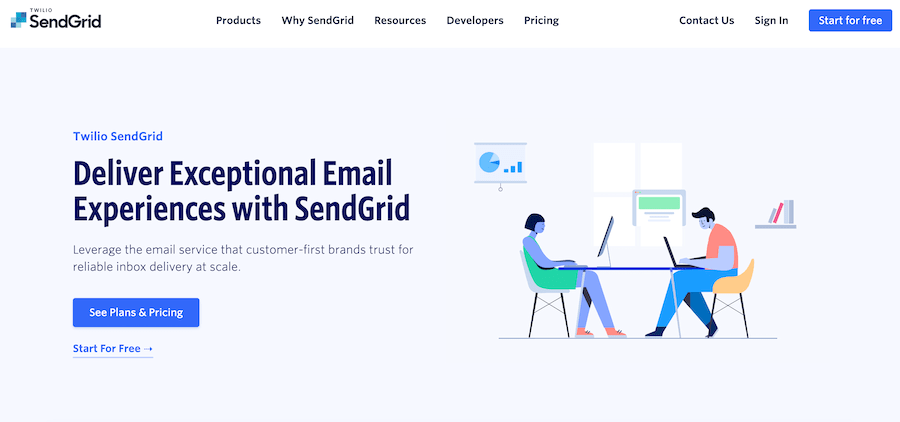
Key features:
- Up to 100 emails/per day with the free plan
- Convenient template editor
- Helpful analytics reports to monitor activity
- Exceptional deliverability insights dashboard for optimizing your email campaigns
- Access to marketing campaign plans
Price:
- Free
- Essential plan from $19.95/month
- Pro plan from $29.95/month
- Premier plan – custom pricing
Bee
Bee is a user-friendly tool designed for creating highly-responsive email campaigns. With its intuitive drag-and-drop editor, even those without coding skills can easily design visually appealing email templates.
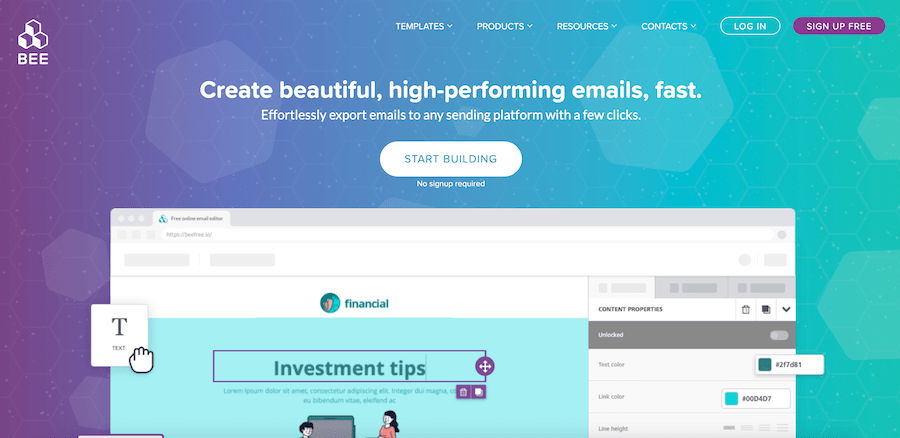
Key features:
- User-friendly drag-and-drop editor
- Wide range of pre-designed templates for emails and pages
- Seamless integration with Mailchimp
- AI-supported email creation with the Pro version
Price:
- Free
- Pro plan for $30/month (15-day free trial)
- Enterprise plan – custom pricing
Drip
Drip takes a unique approach to email marketing with its visual campaign building and process automation features. Whether you are an individual or a team, Drip supports various email campaigns tailored to your specific needs.
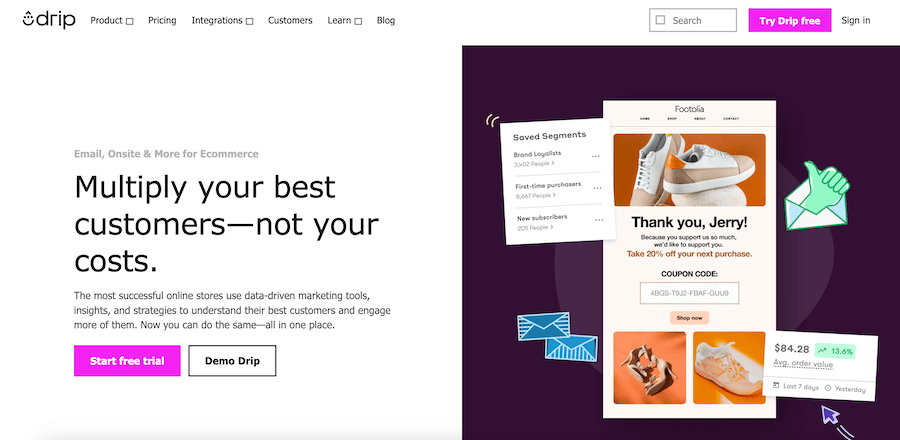
Key features:
- Fully customizable email templates
- Integration with eCommerce platforms like Shopify and WooCommerce
- Ability to convert leads into customers through targeted email automation
- Access to important data including customers data, viewed products, and purchasing history
Price:
- From $39/month (14-day free trial)
Streak
Streak is a CRM plug-in that offers online store owners a comprehensive solution for managing their business activities directly from their inboxes.
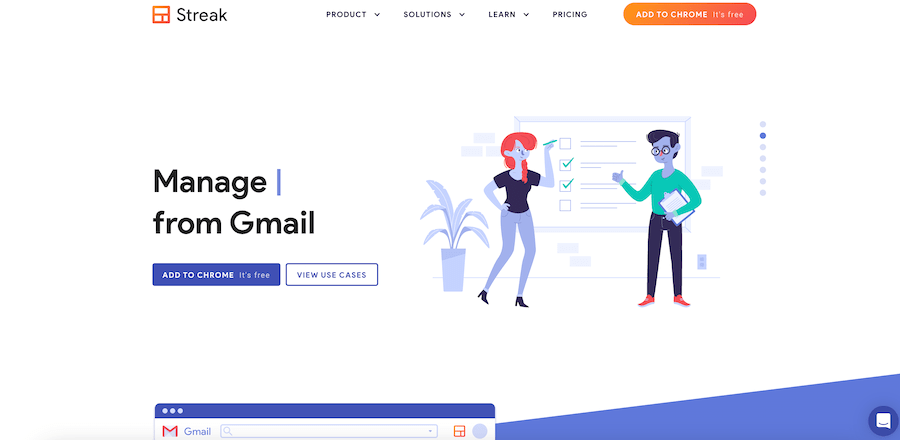
Key features:
- Efficient sales tracking
- Helpful task manager
- Customizable workplace
- Advanced reporting tools
- Integration with Gmail, Google Sheets, Google Calendar, Google Drive, Google Docs, and more
Price:
- Free
- Essential plan for $8/month
- Business plan for $12/month
NeverBounce
NeverBounce is a great app certain to provide much better results when sending emails and newsletters to potential customers. Its key feature allows all bounced emails to be removed from the list, and not just those, but potentially harmful and recommended emails as well.
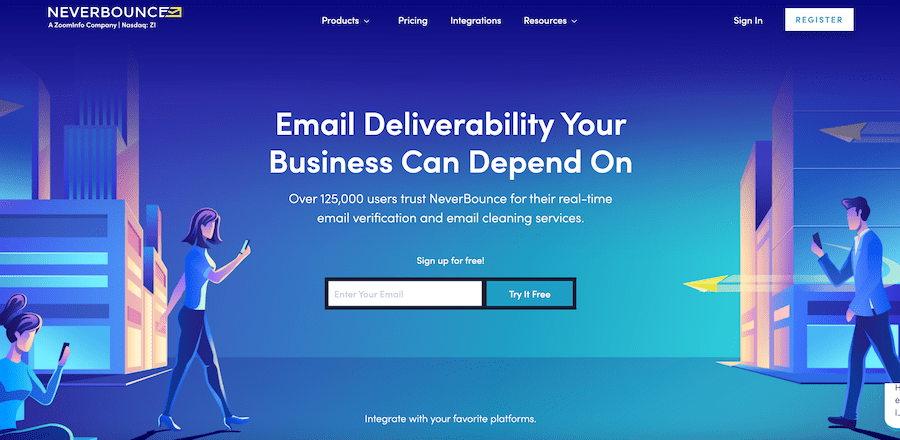
Key features:
- Email list cleaning
- In real-time email verification
- Integration with Mailchimp, HubSpot, Drip, MailerLite, iContact, and Act-on
Price:
- Flexible pricing based on your number of email contacts
Omnisend
With features tailored to track your customer’s journey and convert first-time store visitors into loyal customers, Omnisend offers a comprehensive solution to boost your online business.
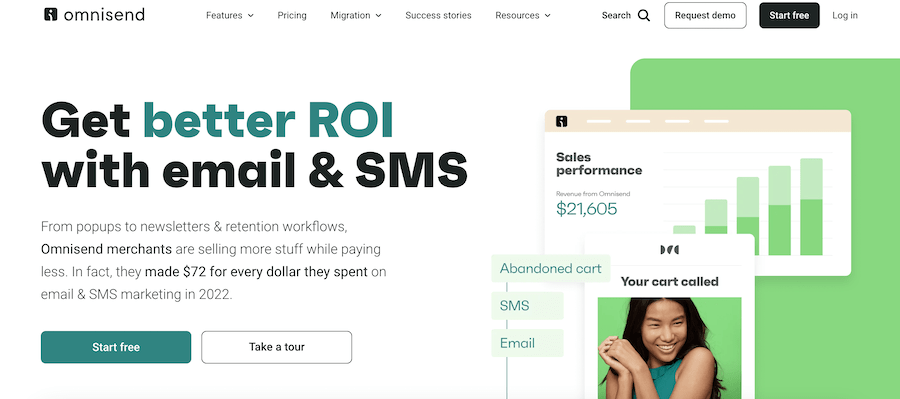
Key features:
- Fully automated email campaigns
- Pre-build workflows
- Ready-to-use email and newsletter templates
- Helpful popups and signup forms
- Detailed performance reports
Price:
- Free
- Starter plan for $16/month
- Pro plan for $59/month
Privy
With Privy, you can provide each of your customers with consistent and personalized emails that stand out in the competitive market.
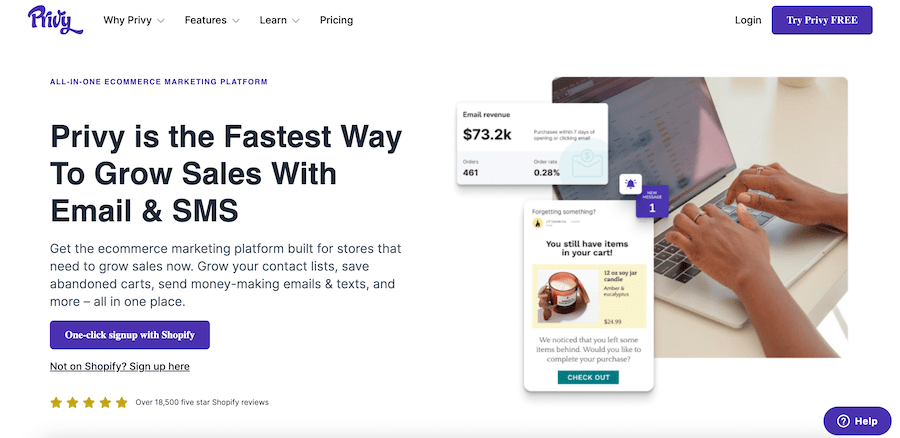
Key features:
- Create customized email templates with the drag-and-drop editor
- Benefit from convenient email marketing automation
- Use mobile-optimized popups
- Sync with email service providers
Price:
- Free Plan
- Starter Plan for $30/month
- Growth Plan for $45/month
FreshMail
FreshMail stands out with its unique template editor, offering users a wide selection of templates to create visually appealing newsletters. The software is available for various operating systems and devices, ensuring convenience and accessibility.

Key features:
- Auto-responds to emails
- Real-time email tracking
- Automatic A/B testing
- Popup forms creator
- Spam inspector
- Compatibility with operating systems Windows, Linux, Android, and iOS
Price:
- Pricing plans available after creating an account (14-day free trial)
Emma
Emma is regarded as a smart email marketing tool that empowers businesses across diverse industries, including eCommerce, catering to entrepreneurs’ specific marketing goals.
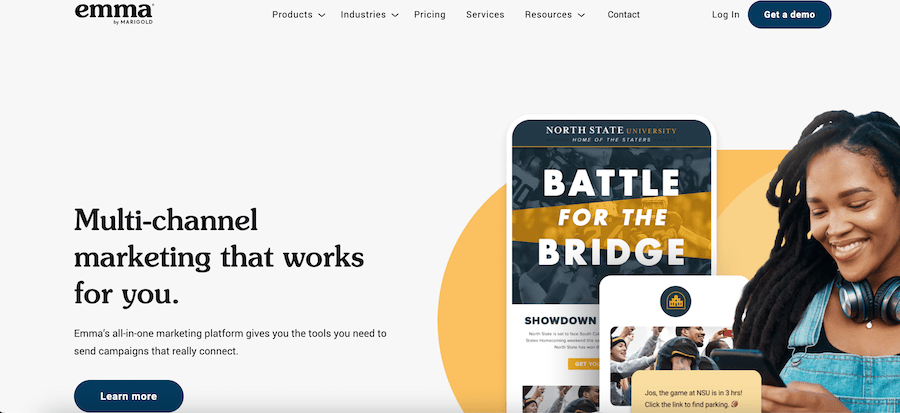
Key features:
- Email automation
- List segmentation
- A/B testing capabilities
- Mobile and desktop-optimized designs
- Drag-and-drop email editor
- Integration with Shopify, Zapier, Eventbrite, OpenTable, and Evertrue among others
Price:
- Emma Lite plan for $99/month
- Emma Essentials plan for $159/month
- Emma for teams plan for $249/month
- Emma corporate – price upon request
PutsMail
When it comes to email marketing, ensuring the quality and compatibility of your HTML emails is crucial before sending them to your audience. That’s where PutsMail comes in. Launched in 2011, PutsMail has gained the trust of thousands of users who rely on its powerful features to test over 60,000 emails within just a year.

Key features:
- Quality testing of HTML emails before sending
- CSS Inliner to improve design compatibility
Price:
- Free
GetResponse
GetResponse is an email marketing tool trusted by numerous big and small brands, including Ikea and Henkel. It focuses on generating leads, engaging customers, and increasing online sales based on a personalized approach.

Key features:
- Create unique layouts for your emails
- Choose from free professionally-designed templates
- Use free stock photos and GIFs
- Generate automated email sequences
Price:
- Email Marketing plan for $13.month
- Marketing Automation plan for $44/month
- eCommerce Marketing plan for $86/month
Campaign Monitor
Campaign Monitor is quite an easy-to-use tool that enables users to create effective eCommerce email campaigns with a drag-and-drop email builder.

Key features:
- Customizable template designs
- Custom coded templates
- Drag-and-drop builder
- Mobile optimization tools
- Free photo gallery
- Real-time reporting
- Access available to multiple users
Price:
- Basic plan for $9/month
- Unlimited plan for $29/month
- Premier plan for $149/month
Freshsales
Designed more like a personal organizer than CRM software, Freshsales lets its users arrange leads, organize contacts, and send out emails.
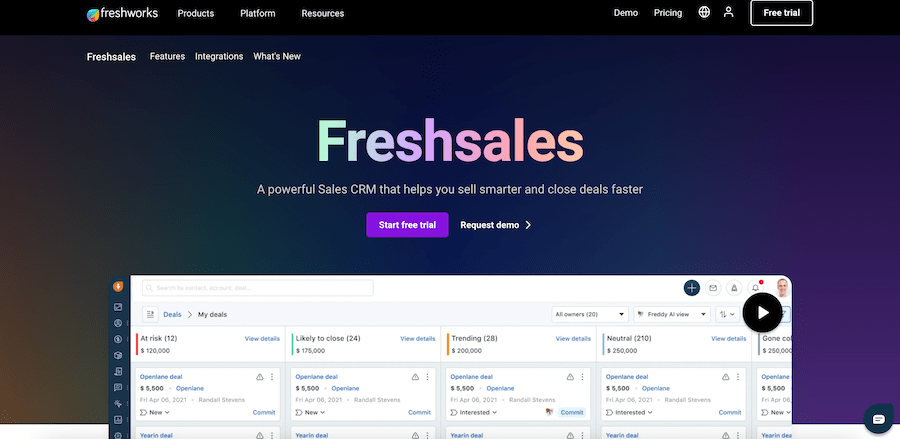
Key features:
- Track customers’ interactions with your website
- Send out personalized email campaigns
- Automate your sales processes
- Provide support to your customers via WhatsApp, Facebook Messenger, Apple Business, Chat, and LINE
Price:
- Growth plan for $18/month
- Pro plan for $47/month
- Enterprise plan for $83/month
Sumo
Described as a set of solutions for website traffic growth, Sumo helps increase the number of signups and subscribers and increase online sales.
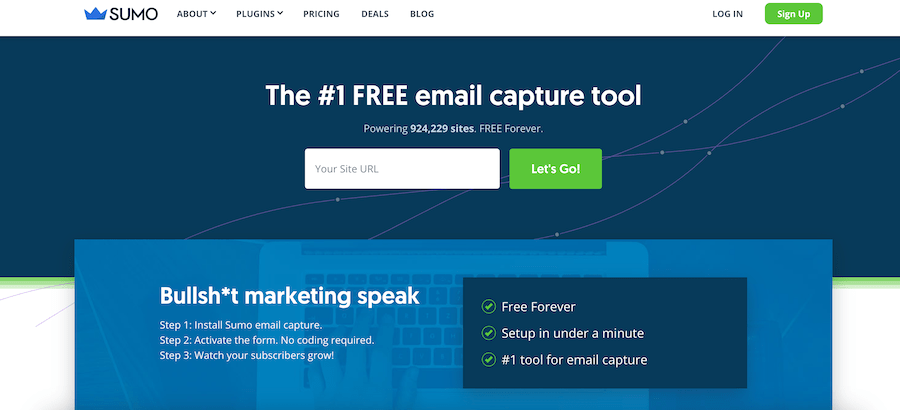
Key features:
- Content analytics
- Visitor targeting
- Email integrations
- Email popup forms, heat maps, and list builders
Price:
- Free
- Pro plan for $39/month
Bonus eCommerce Marketing Tools
MailTester
MailTester is a convenient tool you can use to decrease the ‘spam alert’ of your emails. The solution MailTester offers is invaluable for anyone who wants to keep 100% scam-free email communication.
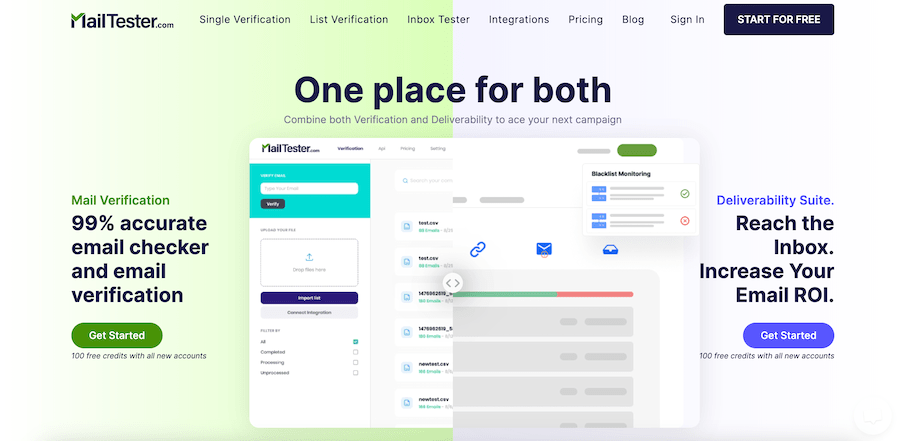
Key features:
- Removes spammy emails with sketchy TLDs and high-risk keywords
- Gets rid of duplicate emails
- Disposes of emails with inactive or invalid domains
- Detects emails with invalid syntaxes and deletes them
Price:
- Pay-as-you-go plan starting from$19/per email
- Subscription-based plans starting from $39 – $299/month
HubSpot
HubSpot is a software tool offering full-funnel marketing solutions. The tool can help you find and convert leads, drive traffic to landing pages, and track overall progress. There’s no need for advanced skills as the dashboard is simple enough for everyone to use.
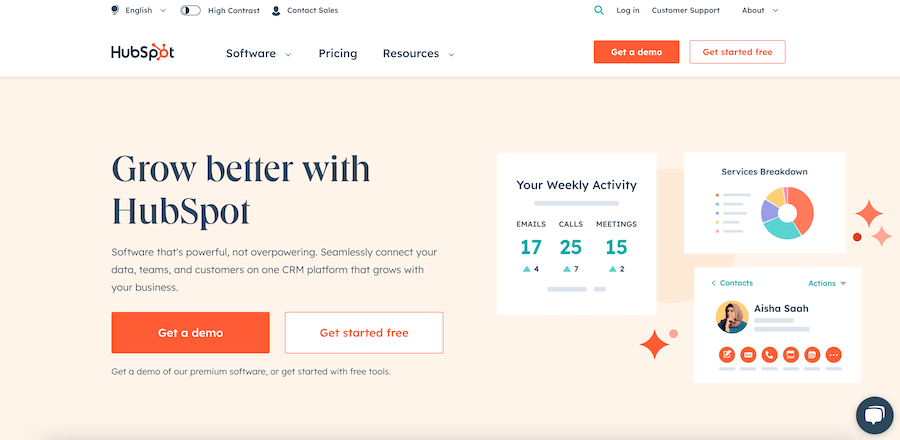
Key features:
- Personalized marketing campaigns
- SEO-optimized webpages pages and blog posts
- Built-in analytics tool for tracking results
- Generate leads with form builder
Price:
- Free
- Starter plan for $45/month
- Professional plan for $800/month
- Enterprise plan for $3,600/month
WPForms
If your online store is established via WordPress, you mustn’t overlook WPForms. With over 10 million users, WPForm is a popular plugin solution for a reason – it offers plenty of features that’ll help you get your marketing campaigns to the next level.

Key features:
- Create custom user registration forms
- Generate user-friendly and mobile-optimized templates
- Benefit from anti-spam protection
- Verify phone numbers, emails, and credit cards with the field validation tool
- Get weekly email summaries of your campaign performance
Price:
- Basic plan for $49/month
- Plus plan for $99/month
- Pro plan for $199/month
- Elite plan for $299/month
Google Alerts
Google Alerts is a free tool that enables users to set specific alerts that’ll inform them about the particular information they’re interested in getting.

Key features:
- Stay informed about the latest news and trends
- Set up custom alerts based on specific interests
- Set search and alert filters by source, language, and region
Price:
- Free
Mixpanel
Mixpanel is a highly efficient conversion rate optimization software. By showing the activity visitors take on your website, the tool can help you improve certain marketing areas and work on increasing your online sales.
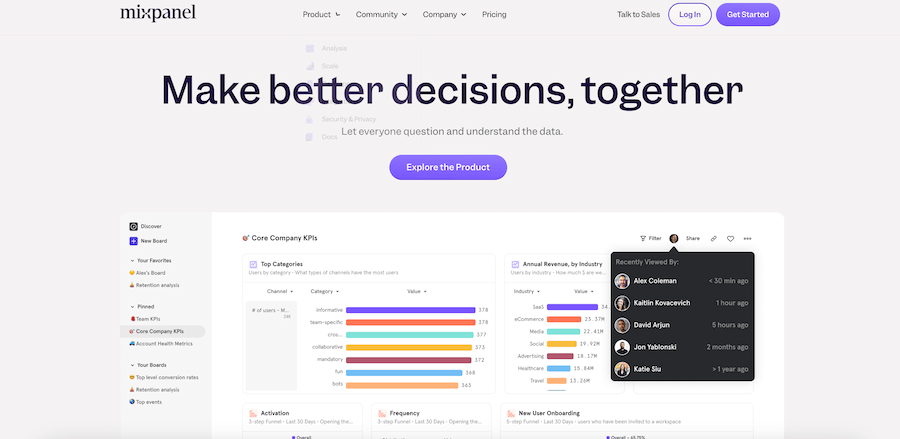
Key features:
- Analyze customer behavior
- Monitor events in real-time
- Send ad campaigns with Google Ads and Facebook Ads
Price:
- Free
- Growth plan for $20/month
- Enterprise plan for $833/month
SimilarWeb’s Digital Marketing Intelligence Tool
SimilarWeb’s Digital Marketing Intelligence tool is a marketing platform that offers deep website traffic analysis.
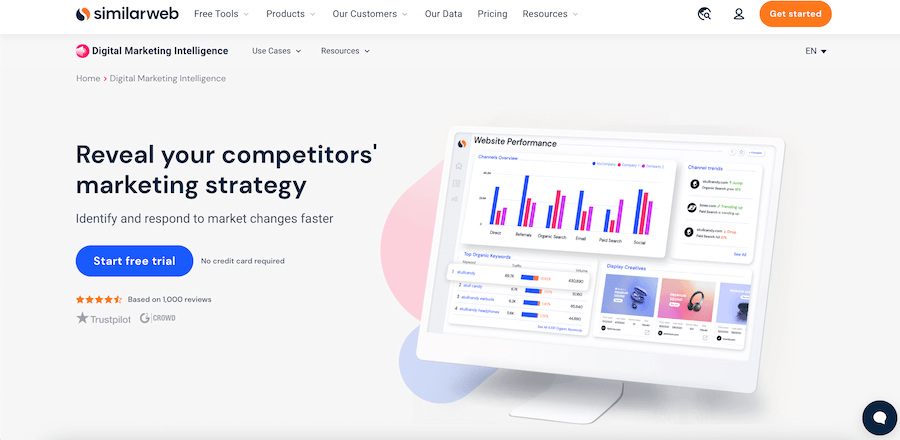
Key features:
- Keyword targeting
- SEO optimization
- Competition analysis
- PPC recommendations
- Ad campaign suggestions
Price:
- Free trial
- Price upon request
Google Fonts
Having a unique branding is what can distinguish you from your competitors. Google Fonts is another completely free tool that’ll help you improve your website’s looks and generate an image for your store that’ll stand out from the crowd.

Key features:
- Vast collection of fonts available in over 135 languages
- Numerous customization options
- Easy integration into websites
Price:
- Free
Placeit
Placeit is an outstanding design tool with over 10,000 templates to assist you in creating the perfect design for your store.

Key features:
- Unlimited access to an extensive template library
- Users can also find video templates and logos
- +100,000 image and music assets
Price:
- From $7/month
Hashtagify
Hashtagify is an innovative eCommerce marketing tool that helps entrepreneurs to be the first to know about current and incoming trends by providing exceptional features that allow them to track hashtags on various social media platforms.
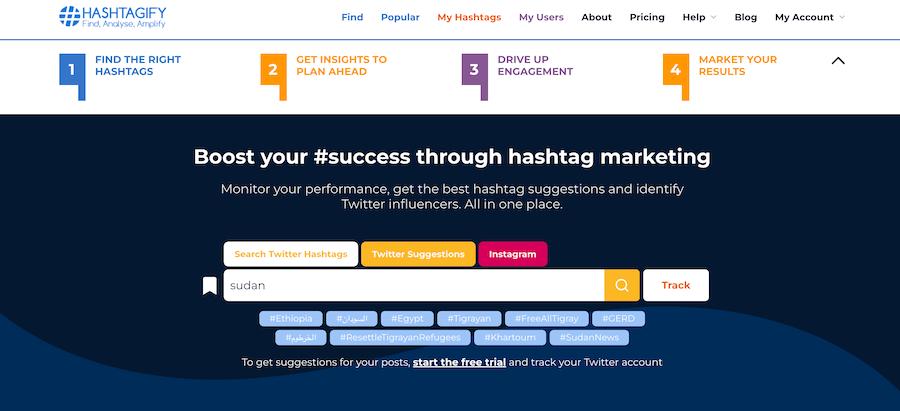
Key features:
- Explore trending hashtags
- Track relevant hashtags to your business
- Receive in real-time insights
- Download Chrome Extension to get hashtag recommendations while on Twitter
Price:
- Personal plan for $29/month
- Business plan for $86/month
- Enterprise plan for $311/month
- 7-day free trial
AdRoll
AdRoll is an eCommerce tool that can tremendously ease up the process of staying on top of your marketing efforts and keeping your advertising campaigns optimized and ready to go.

Key features:
- Organize your advertising campaigns
- Launch retargeting campaigns
- Track ads’ performance
- Get insights into customer behavior
- Supports Facebook, Instagram, TikTok, and YouTube ads
Price:
- Pay-as-you-go plan
- Marketing & Ads Plus plan from $36/month
ConvertKit
ConvertKit is a multi-feature marketing platform offering a wide range of tools that can help you nurture your targeted audience, generate email campaigns, build a strong reputation for your brand, and keep an eye on your business growth.
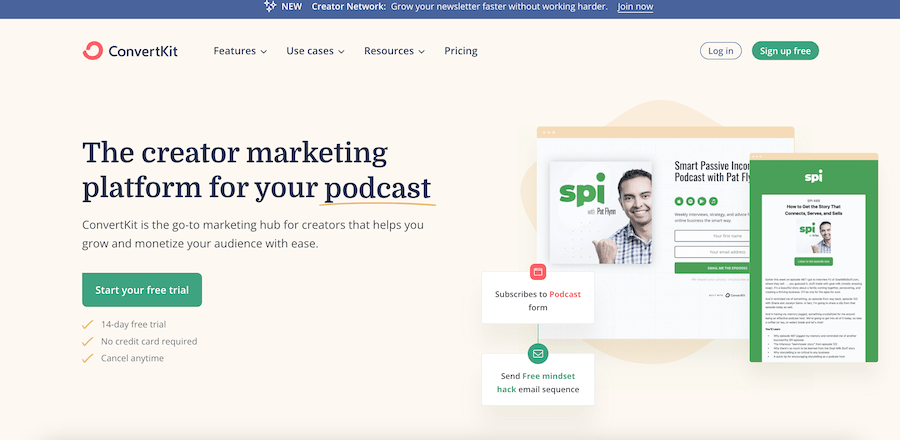
Key features:
- Customizable form, email, and landing page templates
- Access to audience segmentation
- Ability to track subscribers’ activity
- Benefit from automated email sequences
- Over 70 app integrations
Price:
- Free
- Creator plan for $15/month
- Creator Pro plan for $29/month
Google Trends
Google Trends can bring major benefits to your eCommerce business as it provides you with the latest trending searches online, letting you know what products are currently popular which can be used as an indicator of your marketing team’s next strategies.
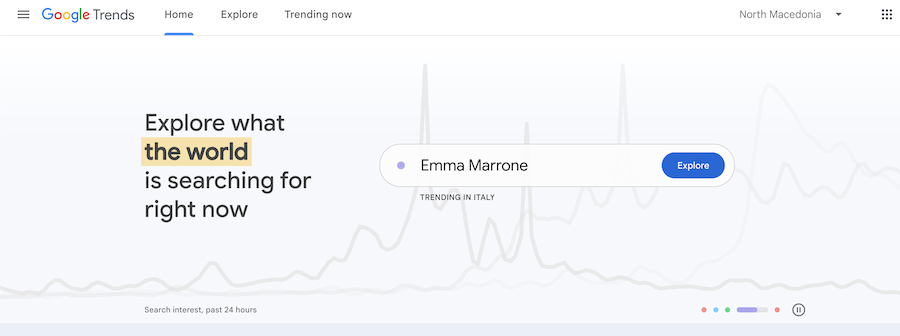
Key features:
- Search for currently trending keywords
- Discover popular search queries
- Perform research based on time and location
Price:
- Free
Wrapping it up
Building and growing an online store requires a solid eCommerce marketing strategy, one that will include multiple marketing areas – SEO, social media, email marketing, etc. All of these methods combined in one powerful marketing strategy can lead your online store toward success.
This comprehensive list of tools can support you on the path of expanding your eCommerce business and successfully outperforming your competitors.
FAQ
-
-
Ecommerce marketing refers to the strategies and practices used to promote and sell products or services online.
-
-
Ecommerce marketing tools are designed to assist online businesses in various aspects of their marketing efforts. These can help optimize websites for search engines (SEO optimization), track performance metrics, manage social media campaigns, automate email marketing, conduct competitor analysis, and much more.
-
-
Choosing the right eCommerce marketing tools depends on your specific business needs and goals. Consider factors such as your budget, required features, ease of use, and integration. It’s helpful to research and compare different tools, read user testimonials, and take advantage of free trials or demos to determine which tools align best with your business objectives.
-
-
Yes! In fact, leveraging multiple tools is common practice to cover various marketing aspects comprehensively. By using a combination of tools, you can create a robust strategy that addresses different areas of your marketing campaign.
-
-
Some of the best eCommerce marketing tools include:
- Ahrefs
- Google Trends
- Ubersuggest
- Sprout Social
- Social Champ
- Keyword Tool
- Monster Insights
- Drip
- Mailchimp
- Campaign Monitor
- HubSpot
- Google Alerts
- MailTester
- Omnisend
- Answer the Public
- Grammarly
Related articles
Our clients' success stories speak volumes about the impact BrandsGateway has had on their businesses.
View More Articles








:format(webp)/https%3A%2F%2Fbrandsgateway.com%2Fapp%2Fuploads%2F2024%2F07%2FScreenshot_20240618_140550_Gallery.jpg)
:format(webp)/https%3A%2F%2Fprod-brandsgateway-images.s3.fr-par.scw.cloud%2F2021%2F05%2Fwomens-clothing-1-aa0164ad-aaa.jpg)
:format(webp)/https%3A%2F%2Fbrandsgateway.com%2Fapp%2Fuploads%2F2025%2F01%2Fincreasing-sales-scaled.jpg)
:format(webp)/https%3A%2F%2Fprod-brandsgateway-images.s3.fr-par.scw.cloud%2F2021%2F05%2FList-of-the-best-dropshipping-books-a3e8f413-00a.jpg)
:format(webp)/https%3A%2F%2Fprod-brandsgateway-images.s3.fr-par.scw.cloud%2F2021%2F12%2Fdropshipping-clothing-france-e217776f-0aa.jpg)
:format(webp)/https%3A%2F%2Fprod-brandsgateway-images.s3.fr-par.scw.cloud%2F2020%2F06%2Fdropshipping-suppliers-canada-222148f0-f12.jpg)
:format(webp)/https%3A%2F%2Fprod-brandsgateway-images.s3.fr-par.scw.cloud%2F2023%2F01%2Fhat-dropshipping-suppliers-9291cbd3-fb8.png)
:format(webp)/https%3A%2F%2Fprod-brandsgateway-images.s3.fr-par.scw.cloud%2F2019%2F01%2Fmarketplaces-to-dropship-ac9bda61-0b8.jpg)
:format(webp)/https%3A%2F%2Fprod-brandsgateway-images.s3.fr-par.scw.cloud%2F2022%2F03%2Fonline-store-pricing-96cb60cd-147.jpg)